#and if i start learning kanji for japanese words
Note
mm sometimes i think my yanderes would take advantage of the fact that I cant do some of the things most people can do with ease like tying their shoes or telling the difference between left and right, or the way i absorb info just to force me into being a baby. Mommy kakyoin would coax me into his lap after heavily drugging me, so I just happily melt into his embrace as he asks me what sound a puppy makes only to be met with a soft whimper of me trying to speak.. or diavolo making me do kindergarten level math in the playpen he keeps in his office for me. -📱
I've been having some trouble with doing tasks most people can do, so it is fun to think about different yanderes making you do baby-level math worksheets, or French vocab sheets and crosswords meant for little kids. Or having those grid papers to write Cantonese and Mandarin, or in your case with mommy Kakyoin, katakana. Why bother teaching you kanji or hiragana? You'll only be confused. And hiragana is more commonly used-- he doesn't need you knowing what common signs and objects actually say. Then you won't feel as lost, should you manage to slip away from his hands for a moment.
Diavolo knows worksheets aren't any fun-- he'd give everything to not have to do them, and still know the people he cares about would be okay. So instead of a little duotang with worksheets for your math, linguistics, or animal noises, Diavolo tries to set up little activities for you to do every day. Little trays with a number of the day, clay in one dish so you can draw the number yourself, roll it on a die, and count it out of marbles. Calling an animal handler to show you the different birds and bugs of the devildom in the throne room (and saving trips to the royal zoo for weeks you've been extra good!).
#I'm wondering what would be more advantageous (by which I mean less helpful) to teach someone in japanese? Katakana? Hiragana? Kanji?#they're ALL used#but some are more grown up than a little kid that still needs Kakyoin for everything#Most old documents are written in katakana. You'd sound so old. Like a little kid that still says “gee willikers batman”#but granted you'd typically mix katakana and hiragana AND kanji in a sentence and coversation#so if he really wanted to nerf you he would only teach you how to spell one way#Kanji is hard to learn (in my opinion just reading this) but if you learn 1000 words you can just suss out what most things say#oh don't get me started on the SLANG#man what a high pressure environment to learn a language... Kak is also such a menace if you lash out or get frustrated#man DEF teaches you the wrong words for things on purpose.#cellphone anon#anon confession#yandere agere#yandere daddy diavolo#yandere mommy kakyoin
32 notes
·
View notes
Text
be careful you guys, there are sickos out there that memorize ciphers, alphabets, and writing systems for fun. and they LIKE it
#I'm sickos#that's actually a big part of the reason why I started learning japanese#I memorized the httyd runes and would practice writing in them when rtte was still airing#and i used to make up ciphers and stuff in church when i was little#i kinda thought i was more or less alone because in working with japanese learners i quickly discovered that most of them are like#nooo not three alphabets!!! or they're like i hate katakana! kanji is the bane of my existence!!!#and i was like yeah understandable i guess#but then when the linguistics/spanish professor started japanese 101 i asked her how the syllabaries were going#bc those are typically the first big obstacle people run into#but she very enthusiastically was like oh i love it!!! I've already memorized them all. here give me some words to write!#and she grabbed a piece of chalk#and i was like oh. she's a sicko. a freak for writing systems just like me#i should've guessed from the way she had the entire ipa memorized but i guess i just assumed that was a normal lingust thing#pickle pontificates#linguistics#japanese#i guess
2 notes
·
View notes
Text
Every day i report incorrect grammar on duolingo 😔
#the japanese module is apparently really bad at particles. constantly using は when it should be が. like.#i cant explain why it should be ga bc i dont know grammar terms. but im right#japanese grammar is something u feel in ur heart anyways. and my heart is telling me duo is wrong#(and google translate backs me up and also just. remembering how my sensei taught it. which was with a hulk funko pop.)#(maybe thats why i cant explain in words why im right. i just know sensei would be getting out the hulk.)#anyways#28 day streak babeyyyy ive never stuck with anything this long. it helps that its mostly easy baby japanese that i already know#i skipped ahead many units but then they started throwing kanji i haven't learned at me and that slowed me down. f#bel speaks
3 notes
·
View notes
Text
I love how my reading of Japanese has transformed from filling in every kanji with a mental "??" To filling in Most with the mental "??" But then im like OH that one is Tsuki for moon! Or kawa for river! Or sei that they use in sensei and gakusei (what it actually means idk lol)
月川生 just a small sample of kanji I have been genuinely learning
#speculation nation#still way too many i dont know but im GETTING THERE#also fun where im like. 'uhh i think that one means power but I Dont Know how it's pronounced'#or like above and below. i know what those kanji look like but i forget the words in japanese#i know boku and ima and watashi of Course. and sakana and fire and yama and naka#And More. actually a fair deal of them now#unfortunately there are in fact Thousands of kanji so me knowing / recognizing ~20 of them is not that many overall#BUT IT'S STILL MORE THAN BEFORE. and that's what matters 😤#i went to the japanese grill place sunday and on the sign they had the symbols for fire and mountain#火山。and i was just like GASP I KNOW THOSE!!!#it's just such a great experience to recognize things ive been learning. ive been practicing reading japanese anytime it crosses#my path. which actually is a fair deal given that my realm of interests lies in large part with japanese stuff#(aka why i wanted to learn japanese to start with lol)#i was a lil disappointed bc id hoped they would have japanese on the menus too but unfortunately they did not#they Were playing kpop the whole time tho. which is a lil funny actually. sittin at a japanese grill with my white family listening to kpop#ft my jewish grandma asking my sister's chinese boyfriend about the japanese food & him being like I Wouldnt Know#idk where im going with this. it is certainly off topic.#ANYWAYS YEA! LEARNING! it's exciting.
0 notes
Text
going to maccys as a treat tonight
#i had my kanji test and omggggg#i was so well prepared but this teacher is always throwing curveballs#so the last part of the exam was an essay and writing an essay without a dictionary...#let me just say i sounded like someone who just started learning japanese 2 weeks ago#like i promise i know more words omgggg pleaseee#there was also a part where it was like a category and you had to give kanji words within those categories i THINK#like i didnt even understand the explanation#but anyways i didnt understand 3/4 of the categories#but oh well.. this is what i get for taking an N2-N1 class...#its easy enought to learn the kanjis you are given#but having to write sometjing from memory without a dictionary... its over
0 notes
Text
Japanese Linguistic Observations in Spy x Family - part 2
Part 2 - Anya's "Anya-isms"
I think Anya has one of the most interesting ways of speaking out of all the SxF characters. But like with Twilight's dialogue that I previously discussed, it can only be fully appreciated in the Japanese version. Probably the most noticeable thing about her dialogue is how it's written compared to the other characters.
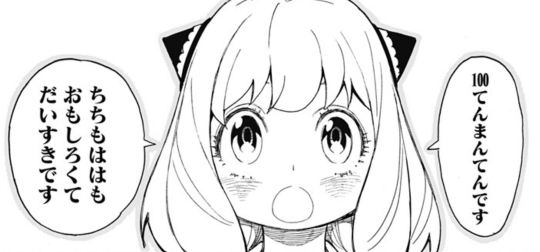
Written Japanese is comprised of three different alphabets: ひらがな (hiragana) and カタカナ (katakana), which together are referred to as "kana," and 漢字 (kanji). Kanji are the characters that hold the meaning of words, while kana simply represent the various Japanese syllable sounds and don't have any meaning on their own (much like the letters of the English alphabet). There are only about 100-ish total unique kana symbols, however, there are over 2,000 kanji in common use today. So Japanese children will start out learning kana and then learn kanji gradually during their school years. This is why Japanese children's books are typically written only or mostly in kana. This is also why manga and books aimed at a younger audience will have kana "translations" of kanji written above kanji characters, which are called furigana.
With that in mind, it's not surprising that all of Anya's dialogue in the Japanese version of the SxF manga is written entirely in kana. Even though using kanji in her dialogue wouldn't necessarily mean she knows kanji, reading a character's dialogue only in kana definitely gives off childish vibes – it conveys feelings of youthfulness and innocence, like "they're speaking only in kana because they don't know the kanji for these words…they're just a little kid, after all." At least, that's the feeling I get when I read Anya's dialogue. Though I haven't read enough manga in Japanese to say for sure, it seems like this concept of making little kids speak only in kana is not unusual, as there's at least one other example I know of: a manga from the mid-2000s called Yotsuba also has a titular 5-year old whose dialogue is written only in kana.
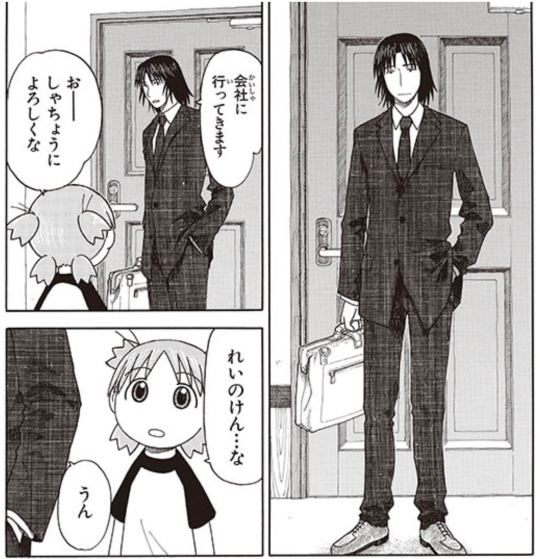
What's also interesting is that all of the other Eden kids speak "normally," using kana and kanji properly in their dialogue. This helps to convey the fact that, despite Anya being roughly the same age as them, their "rich family" upbringing has forced them to grow up faster. In the below panel, you can see how Damian's dialogue uses kanji (with furigana translations) while Anya's uses only kana, even for words that have kanji.
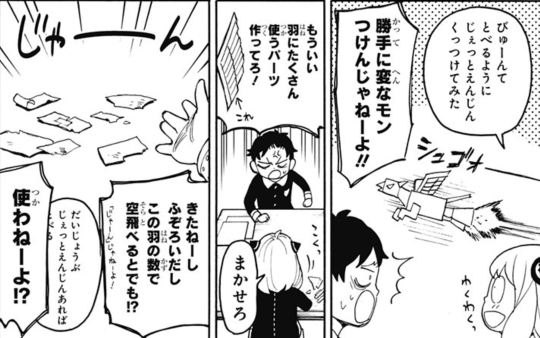
Interestingly, I found at least two cases where Anya does use kanji in her dialogue: when she's calling out the name of her big "Arrow of Light, Seize the Star" move during the dodgeball game, and when she calls out her "Lighting Bolt, Deliver my Aid" move when she tries to throw Yor's weapon back on the deck in the cruise arc. As you can see in the below panels, the names of these "moves" is written in kanji (with furigana translations). This makes sense not only because this is parodying shonen series where the characters shout out the names of their moves, but because it emphasizes how determined Anya was at these moments.
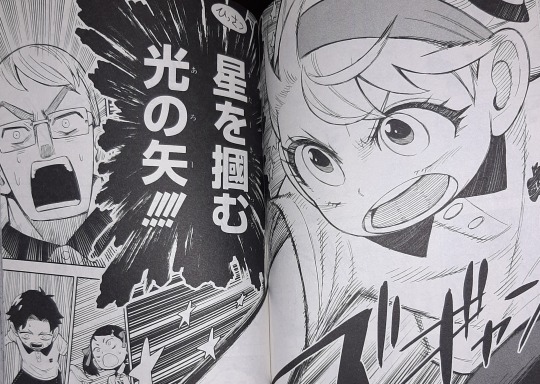
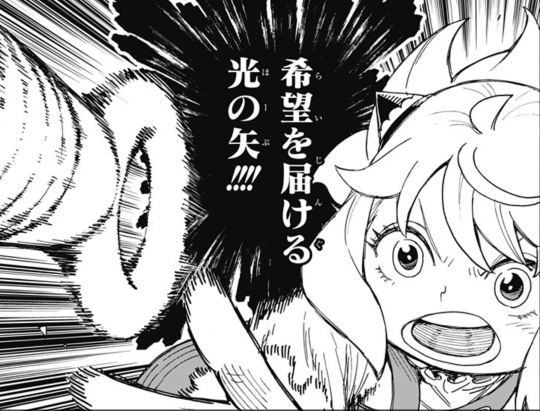
But going back to how Anya's speech compares to the other kids, another thing that stands out is that she speaks very "plainly." Her grammar is (mostly) correct, except for a few mistakes you'd expect a little kid to make. But she uses pretty much no colloquialisms, almost as if she knows the language but lacks the experience for using it in normal social interactions. I don't think this is unusual for a kid her age who's still learning, but it definitely stands out when compared to her classmates. For example, in the below panel, Becky uses normal interjections and other colloquialisms in her speech, like "ne" (ね), "wa" (わ), and "yo" (よ), which are all standard Japanese linguistic devices for softening or emphasizing your sentences. However, Anya doesn't use things like this in her speech. Again, this makes her speech come off as very plain and abrupt, almost like she's not a native speaker.
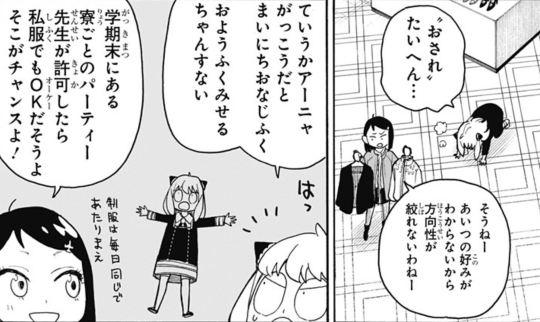
She also refers to herself in third person all the time in the Japanese version. In fact, I don't recall her ever using an "I" or "me" pronoun. I don't know why the English version of the manga doesn't keep this characteristic of her speech. I think it's very important in highlighting the childish aspect of her personality.
Putting all this together – the fact that she doesn't use typical colloquial speech and refers to herself in third person – really emphasizes the childish, naive, and almost baby-like nature of her character. I'm curious if Endo made her speak this way simply to show what a little kid she is compared to her classmates, or if it will somehow tie back to whatever roots she has in classical languages that he keeps hinting at. Regardless, as I mentioned in my full Anya analysis, what she lacks in speech and school smarts, she makes up for in empathy and resourcefulness.
Besides all this, Anya does make typical speech mistakes a normal kid would make, like mishearing words or saying things wrong. She mostly uses casual speech, but does try to use keigo (polite speech) on occasion, though not always correctly. For example, she says "ohayaimasu" (おはやいます) for "good morning" instead of "ohaiyou gozaimasu" (おはようございます).
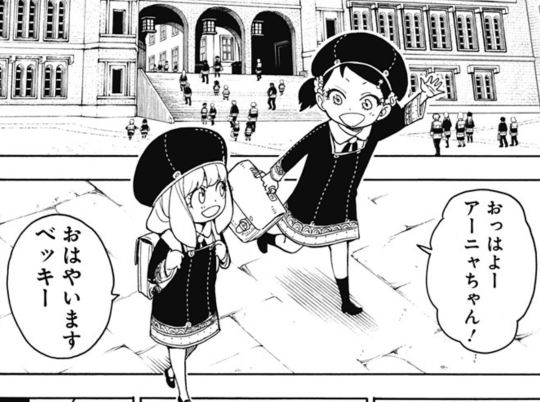
But the most consistent "mistake" she makes (though it's not really a mistake) is what she calls Loid and Yor – "chichi" (ちち) and "haha" (はは) respectively.
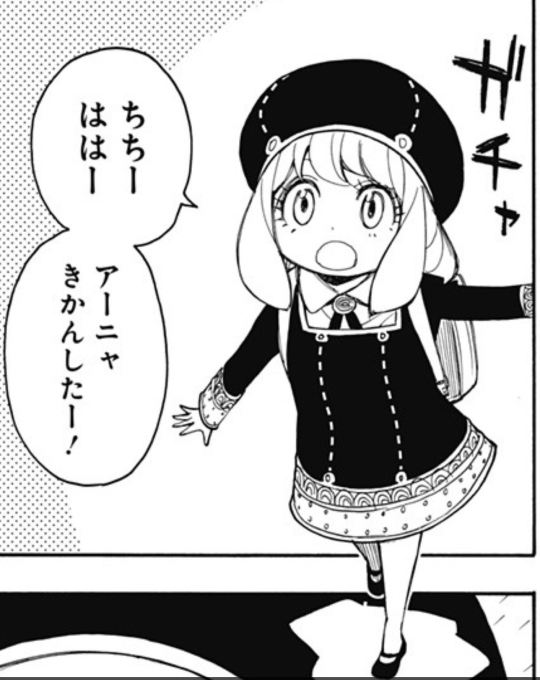
Japanese has many different words for relatives depending on whether you're talking about your own relatives or someone else's, and whether you're talking to them or about them. "Chichi" and "haha" are the general, neutral terms for "father" and "mother," and are also used when talking about your parents to someone else. However, they're not used when talking directly to your mother and father. There are many other words for that, the usual ones being "o-tou-san" (お父さん) and "o-kaa-san" (お母さん), or some variations of these with different honorifics. Damian refers to his dad as "chichi-ue" (父上) which is very formal, while Becky calls her dad the actual English word "papa" (パパ) which is very informal and normal for kids to use. But again, "chichi" and "haha" are typically only used when talking about your parents, not to them the way Anya uses them. This started from the very first chapter where Loid asks her to call him something that sounds "elite." He originally suggests the very formal "o-tou-sama" (お父さま), but when Anya says "chichi," he doesn't bother to correct her.
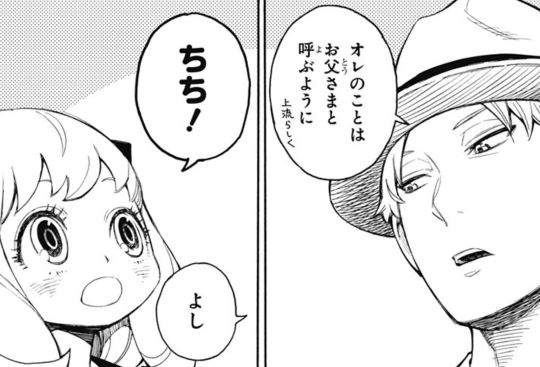
Hearing a little kid call her dad and mom "chichi" and "haha" is kind of like calling them "my father" and "my mother" even when speaking to them directly – it's not wrong necessarily, just strange. But again, this serves to further emphasize the childlike nature of Anya's character.
<- Return to Part 1
Continue to Part 3 ->
502 notes
·
View notes
Note
Now I'm wondering how countries like Japan and China teach literacy.
Since kanji / hanzi don't really have that much in the way of phonetic elements, they kinda have to teach them by memorization and I don't think they have many reading comprehension problems over there.
(Although both countries do have supplementary phonetic writing systems in the form of bopomofo and pinyin for China, and the kanas for Japan)
--
FAVORITE SOAPBOX TOPIC UNLOCKED!
RELEASE THE KRAKEN!
It's a little closer to teaching vocabulary than spelling, but the same kinds of principles apply: You teach the building blocks, like the traditional radicals, which aren't so different from teaching Latin and Greek roots in an English class for English speakers.
And, as a matter of fact, lots of those radicals do predict pronunciation, just not in every single case. They can also be clues to meaning, but again, not absolutely consistently. Many characters have a sound-cueing radical on one side and a meaning-cueing radical on the other. It's just that only some are still useful in the modern day, while others are more like the English word 'plumbing' where knowledge of Roman lead pipes explains why this word comes from the one for lead, but the root probably wouldn't help a kid learn the word in the first place.
One similarity to teaching phonics would be teaching students to tell very complicated and similar characters apart: you want to help a student spot all the little building blocks of the character and then spot the ones that are different, not just glance at the whole character and get a general overall vibe. If you do a whole look-based approach, too many characters are too easy to mistake for one another.
Remembering a bajillion Chinese characters is hard if you're trying to memorize them in a year and not all of elementary school, but I think people who don't read them underestimate how many component parts there are and how approachable they can be if you start by learning fundamentals, not just memorizing a few individual characters as though they have no relation to anything else.
They're actually pretty systematic, just in the way that English spelling is with its overlapping systems and historical artifacts, not in the way that highly regular Spanish spelling is.
Having taken a lot of Japanese classes, I will say that Japanese as a foreign language textbooks often do a piss poor job of this and totally do teach kanji in a sight words-y way... But my Mandarin class started with important foundational concepts that served me well in Japanese later even if I bombed out of Chinese class at the time.
Can you tell how irritated I am by all the foreign language learners who think characters are sooooo hard when, really, it's just their crappy textbook? Haha.
They're moderately hard in the way that learning a full adult spectrum of vocabulary is hard, but people do that for foreign languages all the time. The countries that use characters do tend to make sets that are smaller for certain kinds of applications, same as we have things like simple English wikipedia, but a literate adult will always know lots more, whether it's from their career in engineering or their predilection for historical romance novels.
Uh... anyway, the answer is "Bit by bit in elementary school, just like in any other country".
545 notes
·
View notes
Text
you’re frustrated because you’re struggling to learn Korean - txt
a/n: hello! I thought this post would be a little relatable bc I’m struggling rn with Japanese (but not bc of a man 😋). So much kanji to remember and so many words that they just all mush together. I love the language but it is testing my patience and my memory rn :( please enjoy this and lemme know if y’all speak other languages :) it’s cool to know im not the only one struggling with a trilingual brain🥰 requests are open as usual (no pics belong to me! Found on Pinterest)
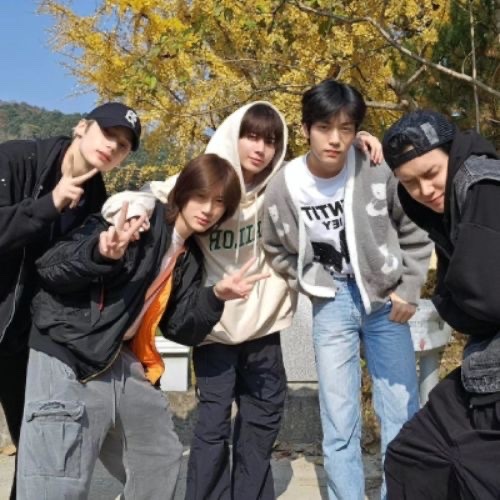

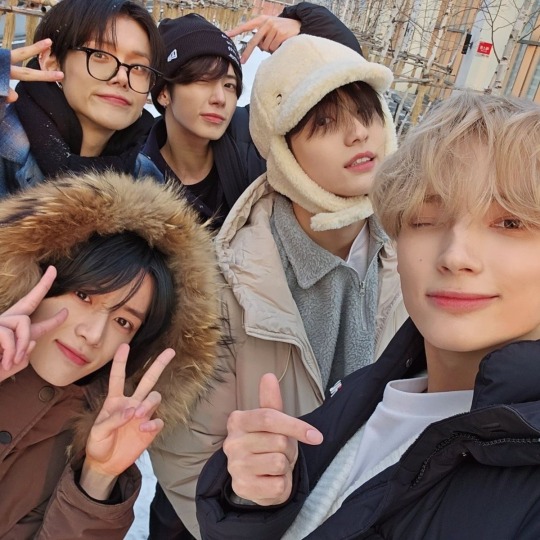
yeonjun
It was actually his idea to teach you Korean, starting with basic stuff such as phrases at the convenience store and at coffee shops. He knew it would help when you had to go out places on your own. You’re on the phone with him after he’s hyped you up and refreshed some phrases for ordering coffee. You finally are up to order and while your pronunciation has been good, you mispronounce a word and your face goes red. You apologize to the cashier who was very understanding and helped you say the word correctly. You paid and thanked them for their kindness. Yeonjun heart could burst at how the cashier was patient with you and how you tried your best and finally said the word right. “Oh my goodness! You did amazing! Next time you’re ordering coffee for the both of us.”
soobin
As the days went by, he could see your passion for learning his language was dwindling. You were struggling with your conjugation skills and he was just trying his best to help you learn and eventually practice. You both are sitting at the kitchen table, with your textbook in front of you (giving flashbacks to elementary math homework). He’s giving you example of conjugations your currently learning and how to used them. It’s starts to all mush up and you can’t figure it out or focus. You start to cry into your hands. He pulls you close to him, “don’t be sad. I promise that you’re gonna learn really soon. I believe in you.” That’s all it took for you to keep trying. He also promised he’d take you for a melona pop if you tried a few more conjugations (I love melona I’m so sorry 🤤…melon and banana are the best flavors not sorry)
beomgyu
homie is so serious and you get mad at him because of that. he’s teaching you silly phrases and on one occasion, he purposely teaches you the wrong phrase. So, you’re out at lunch with his members and you try the phrase on yeonjun and he looks so confused. “Did you just call me dumb?” Your face is furiously red and you run off, crying. Your frustration sets in. Why would be do this to me? He comes after you after giving you some time to cool down. “Baby? I’m so sorry. I didn’t think that would make you so upset. I promise I won’t do it anymore. We’re gonna get serious I swear.” He lures you out by telling you he’s gonna start teaching you from a really good Tex ok that was recommended to him. He also explains to yeonjun what happened and yeonjun gives him an earful as well, taking you side.
taehyun
he actually is a really good person to help teach you. He has the patience of a saint when teaching you grammar. If you’ve attempted Korean, you know how challenging grammar can be to understand. Let’s say you’re out at a restaurant and try to order your own food..you make a mistake and the waiter is looking at you like huh? You start to feel embarrassed but taehyun explains you’re still learning and has you try it again. When you get it right this time, he smiled and the waited smiled as well. The pride he feels when he can see your improvement is like no other. “You did such a good job, honey. Tell you what, how about we get some ice cream after? You deserve a little treat.”
huening kai
I feel like he’d be very empathetic and understanding towards your struggle. He speaks many languages too and understands how frustrating when something isn’t sticking or when you forget words or grammar. For example, you’re at home and you’re both working on vocabulary. you messed up a few words in a row and start to feel discouraged. His best tool to keep you motivated to learn was tell you he was proud of you. He would always encourage you the best he could, “you’re for this bub! I’m so proud of you! I’m gonna keep helping you until you’ve got this :)”
#txt x reader#txt imagines#txt fluff#txt headcanons#txt reactions#ari.speaks<3#txt smau#txt fake texts#beomgyu x reader#txt texts#taehyun x reader#yeonjun x reader#soobin x reader#huening kai x reader
291 notes
·
View notes
Text
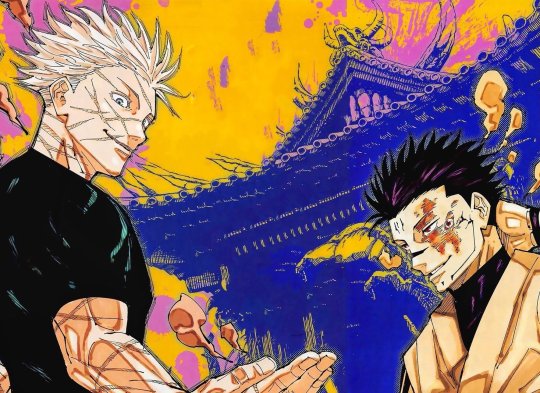
Gonna lose?! It’s Gojō Satoru!!
Karma and consequence in Jujutsu Kaisen
With the release of chapter 235 of Jujutsu Kaisen, the King of Curses has been defeated and Gojō Satoru has cemented his title as the 'Strongest’. The war isn’t over yet, but the battle is won, and I think the outcome of this fight is by far the most interesting for both characters.
Truthfully, at the start of the Shinjuku Showdown arc, I wasn’t particularly rooting for Gojō or Sukuna to win. However, as the fight developed (alongside the release of the anime adaptation of Hidden Inventory/Premature Death), I found myself becoming more and more invested in Gojō Satoru as a character and, consequently, theorising about what a ‘satisfying conclusion’ to his story might look like.
Shortly after the release of chapter 232, I saw an interesting post suggesting that ‘gain and loss’ is the theme of the Gojō vs Sukuna fight. Of course, ‘Gain and Loss’ is the title of chapter 221 when Gojō finally gets out of the Prison Realm only to learn that Sukuna has taken over Megumi’s body. I’d like to go a step further and suggest that ‘gain and loss’ — and by extension, karma and consequence — is actually a key theme of Gojō’s character (and maybe even Jujutsu Kaisen on the whole).
For full disclosure, I wrote about 90% of this before chapter 235 was released, operating on the belief that Gojō would eventually win this fight. It is a long post, so buckle up and let’s get into it!
Gain and loss in Jujutsu Kaisen
The idea of gain through loss was developed very early on in Jujutsu Kaisen with the introduction of binding vows. From Nanami’s ‘overtime’ to Sukuna's open barrier domain, a self-imposed binding vow offers a sorcerer an advantage in combat in return for an increased level of risk. In other words, sorcerers can ‘gain’ strength in exchange for a ‘loss’ of security. When it comes to binding vows, the bigger the risk the bigger the reward.
The idea of gain through loss was further developed through the introduction of Heavenly Restriction. Similar to a binding vow, a person with a Heavenly Restriction is ‘gifted’ with enhanced abilities in one area in exchange for limitations in another. However, unlike a binding vow, Heavenly Restriction exists from birth (although it remains unclear whether it occurs due to mere chance).
There are numerous powerful examples of both binding vows and Heavenly Restriction throughout the series. For Gege Akutami, they are key to maintaining a balanced power system where intelligence and tactical thinking can lead an underdog to prevail in the face of a more powerful opponent — think Yūta beating Getō or Toji beating Gojō. Through these mechanics, we can deduce that understanding gain and loss, give and take, risk and reward — however you want to put it — is crucial to mastery of jujutsu sorcery.
Naturally, if gain and loss are embedded in the laws of the Jujutsu Kaisen universe, it makes sense that the theme exerts a heavy influence over the narrative, too. Of course, consequences are an important way to create compelling characters in any story, but this rings especially true for Jujutsu Kaisen which draws deeply on Buddhist themes and traditions.
In Buddhism, karma is not a deterministic system of retribution, but the natural law of cause and effect. It is directly referenced in Jujutsu Kaisen when Fushiguro Megumi explains his personal ideology using ‘因果’, a Japanese Buddhist term meaning ‘karma’ or ‘fate’ which can be more literally translated as ‘cause and effect’. The second kanji means ‘fruit’, hinting at the underlying agricultural metaphor behind karma in Buddhism: plant a seed, later receive a harvest — or, to use a saying derived from another religion with an important role in Jujutsu Kaisen, ‘you reap what you sow’.
However, an important characteristic of karma which is commonly misunderstood is that the relationship between a cause and its effect is not necessarily linear, but rather part of an intricate network that spans past, present, and future. In other words, the ‘consequences’ of one’s actions might arrive much later.
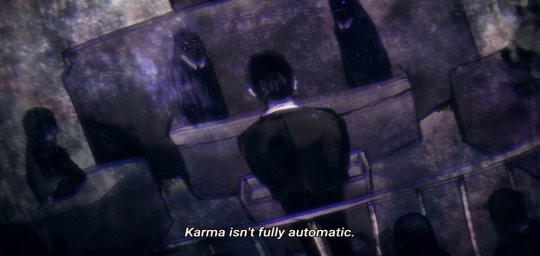
This can lead to mistaking the effect of one cause for the effect of another, creating a reality where ‘bad’ things happen to ‘good’ people and vice versa. The resulting circumstances may make it easier to do ‘bad’ deeds but, importantly, the freedom always remains to choose the path of ‘good’.
Thus emerges a system where liberation from suffering (in Buddhism, the endless cycle of rebirth known as samsara) is not determined by the judgement of some higher power, but by an individual’s continued choice to do ‘good’. In other words, you can create your own destiny, but only if you understand karma.
The beginningless karmic cycle is rooted in actions performed in ignorance. Therefore, breaking free of it — enlightenment — can only be achieved through knowledge.
Gojō Satoru: the embodiment of enlightenment
As a character, Gojō Satoru is symbolically tied to these concepts. We’re told that his birth altered the balance of the world, causing curses to grow stronger in response to the sudden injection of power into the ecosystem. However, while Gojō’s birth might be the cause of the imbalance, his very existence is itself the effect of something else.

Supposedly, the Star Plasma Vessel, the Six Eyes, and Tengen are all connected by fate. However, the term that Tengen uses — ‘因果’ — is the same one that Megumi uses for ‘karma’, suggesting a cause and effect relationship. This is confirmed when Tengen implies that the Star Plasma Vessel and the Six Eyes always appear in response to the merger — the irrepressible effect to the merger’s cause.
Kenjaku cannot contend with the immense strength of the Six Eyes nor the universal law of cause and effect. However, Fushiguro Toji, who possesses no cursed energy due to his Heavenly Restriction, is not bound by fate and is thus able to interrupt a cycle of cause and effect which has existed for at least a thousand years.
Tengen actually suggests that karma (因果) and cursed energy are one and the same so — if we take Tengen’s words at face value — Toji is an anomaly who is free from its bindings.*
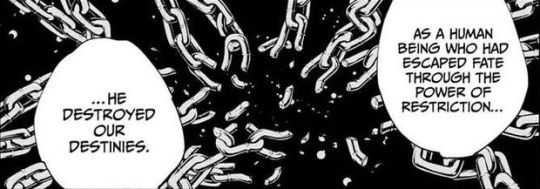
However, the characters whose lives he touches are not. Toji sets another chain of cause and effect into action when the events of Hidden Inventory lead to Gojō’s ascension to 'the Strongest'.
There is much debate in the fandom about whether Gojō’s moment of ‘enlightenment’ is legitimate, especially in light of his fight with Sukuna — the only other character associated with the phrase supposedly uttered by Buddha Shakyamuni at birth.
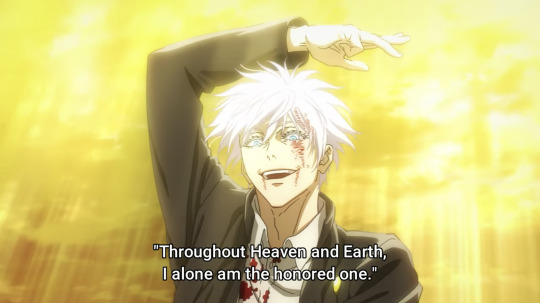
However, if enlightenment is understanding of reality that transcends conceptual thought, then Gojō Satoru is its physical embodiment in Jujutsu Kaisen.
His given name, Satoru (悟), is a verb meaning ‘to know’ or ‘to understand’, and the root of the Japanese Buddhist term for ‘enlightenment’. His innate domain — a representation of one’s innermost self — is a flood of infinite knowledge that constitutes the ‘truth’ of the universe. His Six Eyes are reminiscent of the all-seeing Eyes of Buddha or the Six Transcendental Powers or the Five Eyes — or perhaps all three!
Gojō is steeped in symbolism not only relating to Buddhist enlightenment, but to the founding Buddha himself, right down to his world-altering birth — the divine event which sets the modern-day story in motion.
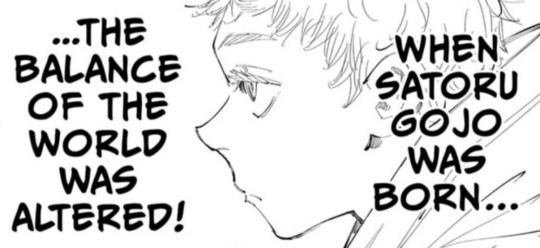
Although he may have spoken Buddha Shakyamuni’s words in a moment of euphoria, the suggestion Gojō had reached a higher state of being was never intended to be called into doubt. The pertinent question, instead, is why the unimaginable strength that accompanies his ascension to almost godlike status seems to bring Gojō more loss than gain — especially when, in a twist of irony, he was only able to gain that strength through loss.
‘The Strongest’ : an allegory for enlightenment
As the two strongest sorcerers battled it out in Shinjuku, the question on everyone’s lips during the weekly chapter discussions was, ‘Who will win?’ However, Jujutsu Kaisen has already established that ‘winner’ is not necessarily always interchangeable with ‘strongest’. Perhaps that’s why, in the aftermath of the fight, the discussion has turned to arguments about which character is the strongest instead — from cursed technique to battle IQ.
Even now, we don’t know much about Sukuna’s abilities nor his character, so it’s always been difficult to accurately judge his strength against Gojō’s. However, a surprising number of people went into this fight believing that Sukuna would win without much trouble.
Some made the reasonable argument that ‘the strongest sorcerer in history’ using the Ten Shadows technique while inhabiting the body of his dearest student presented a no-win situation for Gojō. Others made the much less reasonable argument that Gojō’s claims about his strength were little more than arrogance born from a cushy life in an era of ‘weak’ sorcerers.
Indeed, Sukuna himself echoes that sentiment in chapter 230, going as far as to call Gojō ‘unenlightened’ (凡夫) — before being immediately humbled.
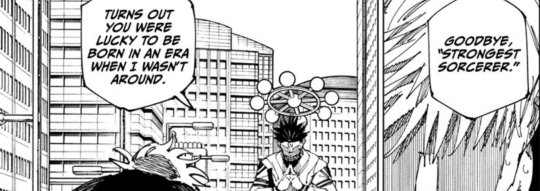
This isn’t the first time that Gege Akutami has directly challenged readers’ assumptions through his characters. However, Gojō in particular lends himself to reader speculation, because Akutami deliberately makes it difficult to know the character by maintaining a narrative distance from him that mirrors his Limitless technique.
This leads to a wonderful phenomenon where the reader falls into the same trap as the characters in the series by assuming that, while other sorcerers are struggling dreadfully, Gojō is having an easy time of things — because that’s what it looks like most of the time. Nanami might be right when he suggests that Gojō could take care of everything by himself. However, just because he could do it, does that mean he should?
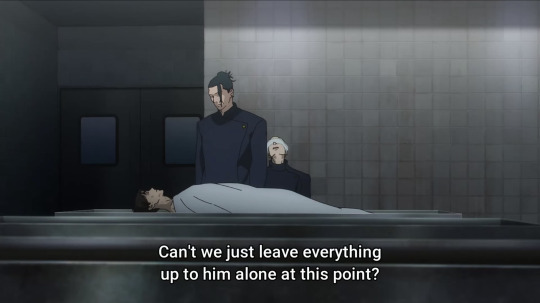
The problem is, with Gojō kept at a distance, it’s easy to forget how he became 'the Strongest’ in the first place. It’s true that, even before he becomes a fully realised Six Eyes user, Gojō’s abilities dwarfed those of any other living sorcerer. For people like Getō and Megumi whose techniques require a very steep learning curve to master, I can imagine that it feels like Gojō’s unimaginable strength was handed to him on a silver platter at times.
However, both things can be true: Gojō was born with innate strength that most sorcerers can only dream of and Gojō is an exceptional talent in his own right.
We all saw the suffering and sacrifice that Gojō went through on his path to becoming a sorcerer strong enough to face the King of Curses. In a series where the primary power source is born from negative emotions, perhaps it makes sense that tragedy promotes strength. Yet, Getō — whose technique is the epitome of strength through negative emotions — experienced the same tragedy as Gojō. So why did they head in opposite directions after the events of Hidden Inventory?
If Gojō is the embodiment of enlightenment in Jujutsu Kaisen, then Getō is his opposite. Where Gojō achieves understanding, Getō is blinded by ignorance which shackles him to a cycle of suffering — the marathon game of jujutsu sorcery.
In blaming non-sorcerers’ inability to regulate cursed energy — rather than the negative emotions that generate cursed energy in the first place — Getō mistakes one cause for another. Following the natural law of cause and effect that is karma, the solution should lie in shedding negative emotions altogether — just like Gojō at the moment of enlightenment.

Sadly, in his quest to find liberation from suffering, Getō actually condemns himself to it. Where Gojō chooses to let go of hatred and anger, Getō chooses to cling to them. This is ultimately why 'the Strongest’ changes from plural to singular. However, all of this assumes that Gojō did things the ‘right’ way when it’s very possible that Gege Akutami actually seeks to criticise a religious doctrine that separates the ‘honoured’ ones from everyone else.
Getō’s response to the horrors he endured evokes sympathy because it feels fundamentally human. In contrast, enlightenment seems so unattainable to the average human being that it becomes almost inhuman — the reserve of gods.
Indeed, Gojō is often accused of having a ‘god complex’, and Gege Akutami’s continued references to the divine don’t do anything to help. However, the series more often paints its strongest characters as closer to weapons of mass destruction or natural disasters, making the reality of ‘the Strongest’ less like reverence and more like dehumanisation.
Although Gojō achieved ‘enlightenment’, he’s ultimately still a human being — something that’s easy to forget. In fact, one of my favourite things about Gojō’s character is how he exists on an almost metatextual level. Too often, characters and readers view Gojō Satoru as 'the Strongest’ first and a human being second — a notion embodied by this notorious panel.
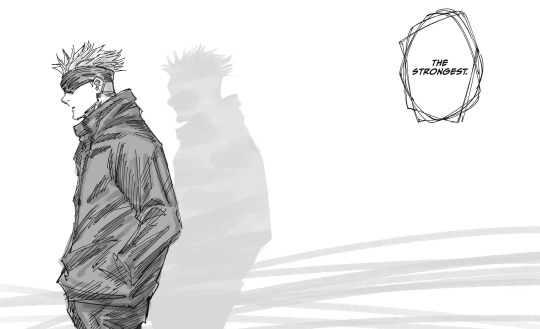
Thus, rather than having a ‘god complex’, I interpret Gojō as a character who struggles with his place in the world. His strength is what keeps him at a distance from the people around him — from the literal distance maintained by his technique to the metaphorical distance that separates him from the ‘unenlightened’.
Even the blindfold he wears to avoid discomfort hides his eyes, shutting off the ‘window to the soul’ and making him a less approachable figure. Thus, the thing that makes Gojō more comfortable around other human beings is ironically the thing that makes others less comfortable around him.
With the power at his disposal, Gojō is frightening at times, and Gege Akutami goes to great pains to show us the brutal potential of such strength — for example, in Shibuya when he ruthlessly dismantles 1000 transfigured humans with the precision of a machine in less than five minutes.
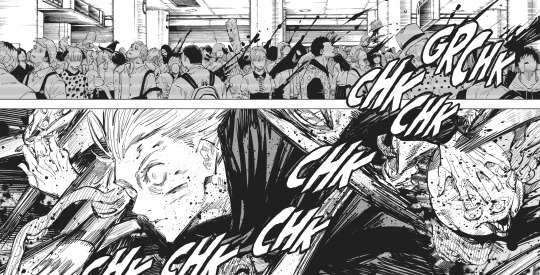
However, this display of violence comes off the back of Gojō’s most compassionate moment in which he bends the laws of jujutsu sorcery to preserve as many human lives as possible. Each time the curses attempt to force his hand, he does the inconceivable, even going so far as to limit his own strength by fighting without his technique to avoid collateral damage to humans caught up in the chaos.
Importantly, he doesn’t agonise over his decisions like the curses expect. Instead, when presented with a choice between two options that fundamentally violate his ideals, he forces another path without thinking. This is Gojō’s ‘overwhelming sense of self’. His commitment to upholding the ‘meaning’ he inherited from Getō is so unshakeable that it’s instinctive; so engrained that it’s unconscious.
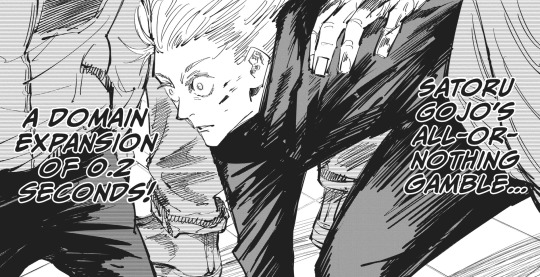
Despite his inhuman strength, Gojō’s actions in Shibuya exemplify his firm stance on the side of ordinary human beings. From his technique to his blindfold, he removes the physical barriers that separate him from the rest of humanity. The result is that, although his display of power in Shibuya is godlike, Gojō never seems more human.
Of course, it’s his humanity that ultimately makes him vulnerable to the Prison Realm, and many suggested that this ’weakness’ is why he would lose to Sukuna — a character who has wholly relinquished his humanity.
Humanity in opposition to strength
The unexpected appearance of his ‘best friend’ in Shibuya causes Gojō to falter for a heartbeat, but it’s long enough to make his brilliance look like foolishness in hindsight. His decision to save innocent people at B5F ultimately leads to the deaths of many thousands more over the course of October 31st and the following Culling Game. Among the casualties of the chaos are some of Gojō’s friends, colleagues, and students — as well as the Fushiguro siblings who were under Gojō’s personal care.
Of the Hidden Inventory arc, Nakamura Yūichi, Gojō’s voice actor said:
‘Even though Gojō had power, he failed his mission, he failed to protect Amanai, and he lost his best friend. He lost everything, and the only thing he succeeded at was awakening his abilities.’
So, it certainly seems true that Gojō’s choice to hold onto his humanity has brought him more losses than wins. In fact, at this point in the story, can we honestly say that Gojō has ever truly ‘won’?
Despite this, the characters in the series never stop thinking of Gojō as ‘the Strongest’. The narrative doesn’t ridicule him for his sentimentality in Shibuya, because it’s perfectly reasonable in the face of Kenjaku’s mind-boggling scheme. Even Sukuna recognises Gojō’s strength in the immediate aftermath of the event.
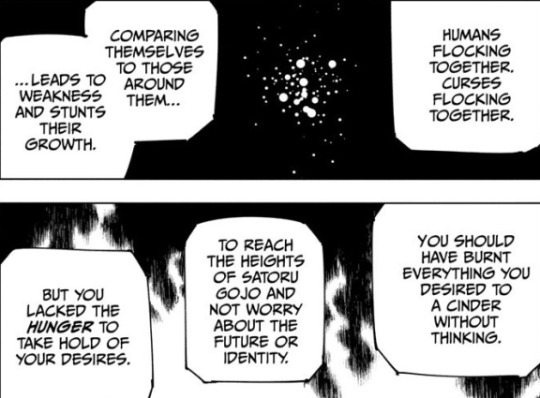
Aside from Kenjaku themselves — who has never suggested that Gojō is anything but immensely powerful — no one has ever criticised Gojō for his humanity. In fact, even prior to the Shinjuku Showdown arc, I’m not convinced that humanity is ever reliably situated in opposition to strength in Jujutsu Kaisen.
Many point to Uro Takako’s conversation with Okkotsu Yūta as evidence that tossing out one’s humanity is the only way to achieve ultimate strength. However, putting aside the fact that the translation warps Uro’s meaning somewhat, it’s unwise to assume that Sukuna’s is the only way to reach that level, simply because he’s the only example in history of a sorcerer with comparable strength to Gojō.
This is even more true when you take into consideration that everything about the context surrounding Uro’s assertion suggests otherwise. After all, this prideful, vicious sorcerer has just been beaten by a teenage boy who fights solely to protect the people he cares about.
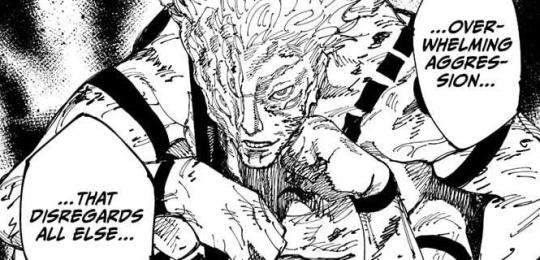
‘Overwhelming sense of self’ — the more accurate translation of the above panel — is about having absolute conviction in who you are as a person. The quality of your ideals is irrelevant as long as your commitment to them surpasses all else, and this has never been Gojō’s issue.
To say that Gojō’s humanity makes him weak misses the point, because it’s never been a question of strength. There’s no need to invent a weakness in the form of his humanity, because we already know his weakness — he told us himself.

Perhaps this starts to get at the the truth of ’the Strongest’ and the solitude that comes with ultimate strength. In Gojō’s own words, ‘When granted everything, you can't do anything.’ Despite being strong, he simply cannot save everyone. So, if being ‘the Strongest’ doesn’t help Gojō towards his goals, then what’s the point in his strength?
Of course, this is why Getō’s parting words hit Gojō so hard. When the boy who taught him that ‘protecting the weak’ is important tells Gojō that he has the power to commit the biggest act of genocide in history, the title of 'the Strongest’ is transformed from a blessing into a curse. I can’t imagine that Gojō ever feels more powerless than when he realises that he’s trying to save people using a body that’s built to destroy — a contradiction that’s illustrated to us in our first introduction (chronologically) to Gojō as a character.

If that wasn’t enough to cause an existential crisis for Gojō, Getō’s follow-up question guarantees it. In challenging Gojō’s assertion that Getō’s goals are impossible to achieve, Getō simultaneously questions Gojō’s identity beyond ‘the Strongest’, unintentionally (or perhaps intentionally) dehumanising Gojō by reducing him to his strength. This is especially painful coming from Getō of all people.
By the end of the conversation, Gojō’s entire worldview has been called into question by the person he trusted most. Getō, who always impressed upon Gojō the importance of meaning, leaves Gojō searching for the meaning in his strength — and, over 200 chapters after Getō asked the question, the answer still isn’t clear. This, I believe, is where the Shinjuku Showdown arc comes into play.
A reason to fight
From a narrative point of view, Getō isn’t entirely wrong to insinuate that Gojō lacks an identity beyond ‘the Strongest’. His primary role in the story has always been to act as a power ceiling from which the reader can extrapolate information about Gege Akutami’s world and its mechanics. Even his absence from the story is meticulously set up to illustrate the anarchy that breaks out due to the power vacuum he leaves behind.
Prior to the Shibuya Incident, Gojō Satoru’s overwhelming strength presented an obstacle to other characters’ growth. In order to create a more balanced playing field and an opportunity to explore creative techniques and fights on a previously unseen scale, it’s understandable that Akutami needed to get Gojō out of the way — at least until Sukuna could join the story as a fixed member of the cast.
As expected, even the strongest sorcerers we encountered during the Culling Game pale in comparison to the prowess on display during the Shinjuku Showdown. It all serves to show that Gojō and Sukuna are on an entirely different level — to the point that, even after Gojō burns out the part of his brain responsible for his domain, his strength still doesn’t dip below that of Okkotsu Yūta and Hakari Kinji.

To paraphrase Megumi, I shouldn’t try to find logic in a powerscaler’s behavioural patterns, but I can’t deny it’s immensely frustrating that week after week fans get caught up in arguments about who is the better sorcerer when it’s the least interesting thing about this fight.
The only reason ’the Strongest’ even existed as a neatly defined category up until this point was because of the lack of any viable opponent for Gojō. Now that he’s fighting someone on his level, comparing these two behemoths of jujutsu sorcery is the same as any other powerscaling exercise: reductive, vulnerable to bias, and ultimately missing the point.
Gege Akutami has never written a fight simply for the fun of seeing two characters go at it. There’s been a greater purpose behind every carefully created match-up in the series, either in the form of high stakes or an important lesson for the characters involved — or sometimes both.
While Akutami clearly enjoyed writing this back and forth between two masters of their craft, carefully balancing the scales to ensure that neither gained the upper-hand for too long, there is a great deal of character development staked on the outcome of this fight.
There are parallels between Gojō and Sukuna as characters but, more than anything, the Shinjuku Showdown arc has exposed some fundamental differences between the two — namely, why they fight in the first place. While it’s true that Gojō is fighting Sukuna partly because there’s no one else who can, it’s also true that the stakes have never been higher for Gojō. He has a lot to gain and a whole lot more to lose, so his reason for fighting feels tangible to the reader.
Conversely, Sukuna’s reason for fighting is considerably less clear. While we don’t know the nature of Sukuna’s binding vow with Kenjaku — or anything about his motivations in general — it doesn’t seem like there’s much at stake for Sukuna except for, perhaps, his pride. Beyond advancing the plot, this poses a lot of interesting questions about what Sukuna would have to gain from winning this fight.
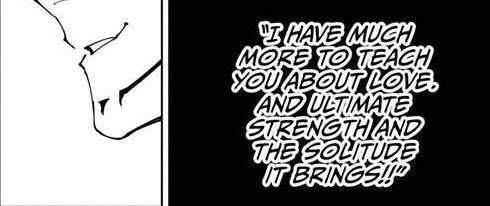
Since Gojō’s return, Sukuna has recalled Yorozu’s words about love multiple times. Their purpose — and Sukuna’s initial reaction to them — are still shrouded in mystery. However, through Gojō, we can learn something about ‘love’ and how it relates to the ‘the solitude of ultimate strength’.
Gojō never wanted to be ‘the Strongest’ alone. In fact, his entire motivation as a character is raising up ‘strong and intelligent allies’, constantly chasing the companionship he felt as one half of the strongest duo and trying to ensure that his students never feel the same isolation that’s plagued him and Getō before him.
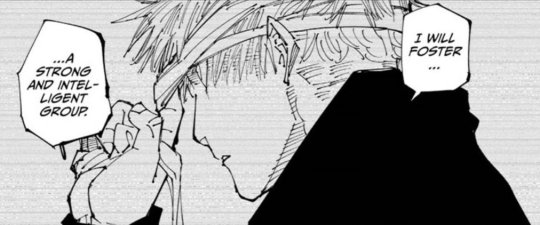
In the recent chapters of the manga, Gege Akutami has made it clear that Gojō isn’t really alone at all — Shōko reminiscing on their friendship in chapter 220; Gojō’s comrades rallying around him during the send off in chapter 222; the wonderful ‘my students are watching’ callback in chapter 230.
What’s more, for the first time in his adult life, we see Gojō — who’s famously in his element when he’s alone — start a fight with people at his side, leaning on three characters who we’ve previously been led to believe he looked down on.
The distance that’s always existed between Gojō and the people around him is closing. He has removed his mask and he is open to the world — the blindfold is gone; the shapeless, oversized jacket is gone; Gojō even removes his technique to let people in during his sendoff. Akutami makes it explicitly clear that Gojō’s allies have got his back, and he’s got theirs in turn — they’re his reason for fighting.

On the other hand, his opponent only has a single ally in all the world and, although Uraume is a devoted servant, there is no suggestion that they would tag in when the going gets tough. Sukuna has already told us that, for him, losing and dying are the same thing — a curious contrast to Gojō who does not put ‘winning’ and ‘dying’ in opposition, and this creates an interesting situation where both fighters could ‘win’ by their standards.
If Gojō saves the people he cares about (and the world at large) but dies in the process, he wins. Equally, if Sukuna is the sole survivor of the fight, he wins — but what would that actually mean for him?
One approach embodies overwhelming selfishness, the other embodies overwhelming selflessness, but only one of these approaches has been established as the most powerful form of binding vow in Jujutsu Kaisen. With all that said, many people believed that Gojō dying to win was the most likely conclusion to the fight — but that’s what a small fry would think!
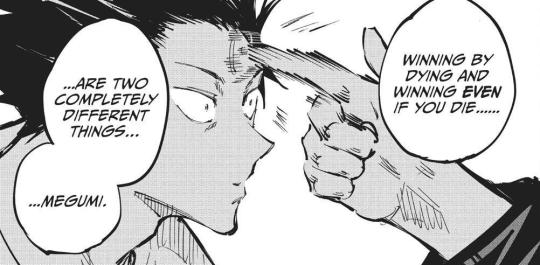
In Jujutsu Kaisen, it has always come down to one question: how much are you willing to risk — not sacrifice — in order to win? This is the lesson that Gojō impresses upon Megumi, and it’s why I was always in the camp that believed Gojō would win and survive. I didn’t expect his victory to be quite so clear cut, but it seems obvious in hindsight — and it’s all thanks to the power of love and friendship.
In chapter 234, Kusakabe suggests that Sukuna is keeping something in reserve, because he knows that if Gojō loses, he’ll immediately have to fight a number of other powerful sorcerers. Gojō knows that there are strong allies ready to back him up if he fails, so he can go all out.
Meanwhile, Sukuna is truly alone — to the point that he has to create allies in the form of shikigami in order to contend with Gojō. In the end, the explanation for Gojō’s victory is simple. Where Gojō gave it his best, Sukuna didn’t — and that was a grave underestimation of his opponent for which he paid the price.
So, the Shinjuku Showdown arc has come to an end and Gojō has reaffirmed that he is, in fact, 'the Strongest'. However, his story isn’t over yet, so what would a satisfying conclusion to his character arc look like?
Are you Gojō Satoru because you’re the Strongest?
Although Itadori Yūji is the main character of the series, Gojō Satoru is foundational to the story — despite how much Gege Akutami jokes about hating him. Gojō’s story is the thread that ties the series together, so landing the ending is crucial for completing not only Gojō’s character arc, but also that of many other characters. For Gojō, everything consistently comes back to Getō Suguru and Fushiguro Toji, but there remain unanswered questions regarding both.
Toji’s presence during the clash of the strongest sorcerers is too large to ignore. Aside from the allusions to Toji himself, his son plays a pivotal role in Gojō’s story as the human representation of gain through loss — the blessing born from Gojō’s curse. Taking Megumi under his wing marked Gojō’s first step towards a brighter future after the tragedy brought on by the failed Star Plasma Vessel mission, but there’s one major plot thread left unresolved.
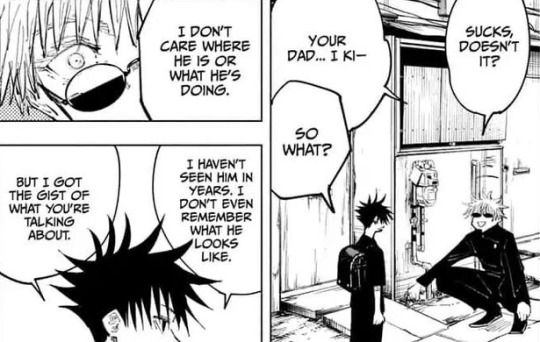
I wouldn’t have thought that Megumi learning the truth about his father was important after he dismisses Gojō’s attempt to tell him during the Hidden Inventory arc. However, the combination of Megumi’s interaction with Toji in Shibuya, his visible cluelessness when Tengen mentions Toji, and the numerous ways Gojō references Toji during the Shinjuku Showdown arc has convinced me that Akutami plans to follow this up at some point.
Right now, Megumi’s fate is still hanging in the balance. Although many people are waiting for something terrible to befall Gojō — losing his Six Eyes; burning out his technique permanently; dying — I’d like to believe that, if we look at Jujutsu Kaisen through a karmic lens, Gojō isn’t owed any more losses. At the very least, he certainly doesn’t have to die to progress the story as some people have suggested.
Our heroes, including Gojō himself, have been on a major losing streak for a long time now. Gojō being freed from the Prison Realm represented a shining beacon of hope at the lowest point in the series. To extinguish that light by killing Gojō almost immediately after he’s returned to the story would be another major blow to the characters and the readers.
I wouldn’t put it past Akutami to send some more pain our way before the end of the story, but if Gojō is going to die on December 24, I don’t think it’s before a number of other things happen.
If Gojō inherited Getō’s ideals in a symbolic ‘passing of the torch’, then his death before he has confirmed the safety of the people who depend on him is a depressing end to his best friend’s legacy. Additionally, up until now, Gojō has never had the opportunity to answer Getō’s question once and for all.
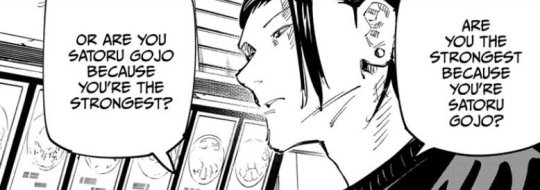
I would argue that Gojō has proven multiple times during the fight against Sukuna that he’s 'the Strongest' because he’s Gojō Satoru, but is he Gojō Satoru because he’s the strongest? He can’t discover that unless he experiences what it’s like not to be 'the Strongest' — either by losing his strength or by sharing the burden with the strong and intelligent allies he’s been raising for the entirety of his adult life.
Of course, there’s one more glaring thread to tie up, and it might be the most important of all when it comes to the completion of Gojō’s character arc. His first thought when he bursts out of the Prison Realm is a desire to lay Getō’s body to rest — a desire to rectify the mistake which threw the entire world into chaos.
As we’ve already discussed, despite his strength, Gojō has racked up a collection of costly failures. Thus, his entire character arc is about learning from the mistakes of his past. He’s taken every cruel loss that the universe has sent his way and, instead of lashing out with all that power at his disposal, he has grown from his experiences and chosen the path of ‘good’ time and time again.
If Gojō dies before retrieving Getō’s body from Kenjaku’s clutches, he has failed his best friend at the very last hurdle, and this would be a truly bleak way to end his story.
Concluding thoughts
At the conclusion of the Shinjuku Showdown arc, I’d like to see Gojō Satoru step back from the fight after inspiring hope in his students by delivering a final lesson in the form of his win. It is impossible to predict what Gege Akutami will do next, but I would like to see the reins handed back to the students for a while, as I feel Gojō has played his part against the King of Curses.
It is Sukuna, not Gojō, who presents the most interesting possibilities for character development after the conclusion of this fight. I am genuinely excited to see how he grapples with this loss that has the potential to challenge his entire view of himself and others. He disrespected Yorozu and treated his fight against her as a ‘test drive’, and thought he could get away with treating Gojō the same way. I think Ryōmen Sukuna might be about to learn some important lessons, and I would love to see him in conversation with Gojō before the latter bows out of the story.
Of course, we can always trust Gege Akutami to surprise us, and it’s entirely possible that the story will veer in a completely different direction than I expected. However, I have faith that he will deliver something profound, no matter what lies ahead.
---
*This is a very interesting concept in and of itself, especially in relation to the goal of the Culling Game, Yuki and Kenjaku’s battle of ideals (i.e. ‘breaking free from’ versus ‘optimising’ cursed energy), Maki’s ‘enlightenment’ in the Sakurajima colony, and the understanding that true enlightenment lies in breaking free from all karma — both good and bad. After all, golden shackles are still shackles. Perhaps I’ll write about this another time.
#jujutsu kaisen#jjk#jjk 235#呪術廻戦#jjk meta#jjk analysis#jujutsu kaisen meta#jujutsu kaisen analysis#jjk spoilers#jjk manga spoilers#jujutsu kaisen spoilers#gojo satoru#sukuna#ryomen sukuna#fushiguro toji#fushiguro megumi#geto suguru#kenjaku#can you see why this took so long???#it's almost 6000 words 💀#and maybe it's all bullshit haha!!#but i'll hate myself if i wasted all that time for nothing#so enjoy i guess!!#my writing#fushiglow
203 notes
·
View notes
Text
YOI-meta: Viktor's apparent insensitive reaction to Yuuri's love confession & what it might mean
There are several ways to read Viktor's comment on Yuuri's love confession depending on the level of his knowledge of the Japanese language and culture at this point in the series. While his words seem insensitive and blunt at first glance, plausible explanations for the choice the creators made here align rather with Viktor's character and the concept of the show than Viktor only caring about Yuuri's appearance in one of the most significant moments of their relationship.
So let's break this down!

1. Language barriers
The press conference of the Japanese Skating Federation, where the skaters participating in the Grand Prix Series present their season theme, is broadcasted on Japanese TV for a Japanese audience. Hence, Yuuri speaks Japanese in this scene. By now, Viktor has been living in Japan for about 5-6 months, and while he possibly knows enough Japanese to get along on his own and communicate with Yuuri's family about basics like food or the weather, complex speeches are probably still beyond his abilities.
Besides Russian, Viktor speaks English and French, so we can assume he has a knack for languages. But whereas Cyrillic and Latin characters have some resemblances, Japanese has three different types of characters (hiragana, katakana, and kanji), and these differ vastly from Western scripts. Beginners spend a hell lot of time learning these in addition to vocabulary and grammar. It's not a stretch to assume that Viktor understood parts of Yuuri's speech but not enough to connect the dots. Like "here, Yuuri presents his season theme which is about love... Oh, I heard my name! He's talking about me now! ... Was that something about a gold medal and Grand Prix Final? That's my Yuuri! He's so fierce! I love this! But ugh, he really needs a new tie! That hideous thing doesn't fit his new image at all!"
2. Utter shock
That face...
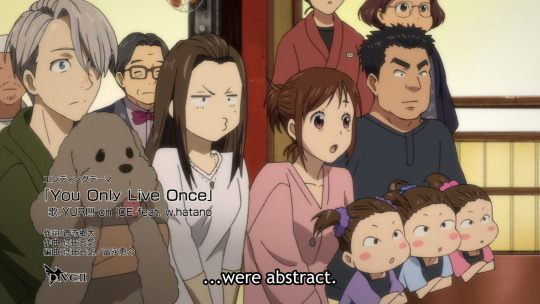
Looking at this scene, Viktor is either completely shocked because he didn't see this coming or trying hard to understand Yuuri's speech. While in my personal headcanon, language barriers keep him from understanding the speech, a person who is described as a genius and already speaks three languages might be able to follow the speech after living in the country for several months (I'm not sure about this though, but some people learn at lightspeed once they start obsessing over a subject). In this case, his reaction is a coping mechanism due to overwhelm. So far, Yuuri has said a few sweet things that showed Viktor how much he matters to Yuuri, but this is a whole new dimension of expressing affection, especially coming from someone so reluctant to voice their feelings. And while Viktor undeniably has been hoping for Yuuri to love him back, seeing his love confessing his feelings live on national TV is quite something to process.
Which leads me to...
3. Viktor doesn't take Yuuri's love confession seriously
This interpretation falls into the category of "Did we watch the same anime?" and I will briefly explain why using some past instances of Viktor's reaction to Yuuri using love language:
Episode 2 "I want to eat katsudon with you!":

Episode 3 "I'm going to become a super tasty katsudon. Please watch me!":
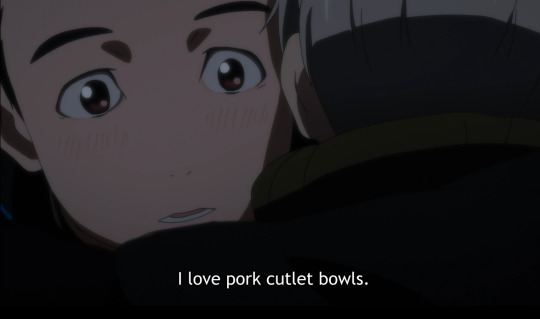
Episode 4 "I want you to stay who you are":
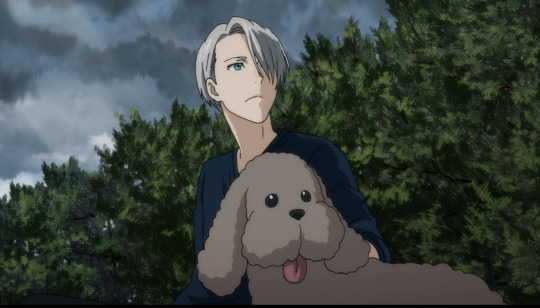
We see the occasional confusion, which is attributed to the fact that Viktoir is still familiarising himself with Yuuri's unique way of expressing his feelings and desires. However, in all these scenes, Viktor is genuinely happy that he means so much to Yuuri. Although Viktor can be insensitive at times, he never mocks Yuuri, which speaks volumes about his character. Not even when Yuuri says things like "Katsudon is my eros!" It's not in his personality. So far, throughout the series, Viktor has helped Yuuri become more confident and express his feelings. As soon as he understands Yuuri's speech and has processed the meaning, he would burst with happiness because Yuuri loves him back and pride because of how confident Yuuri became. But mocking Yuuri for his necktie when he just expressed the full dimension of his feelings? Just nope. He's not JJ.
Bonus: Viktor's reactions after episode 5 (the pattern continues)

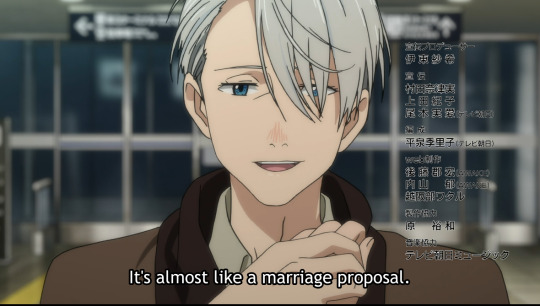
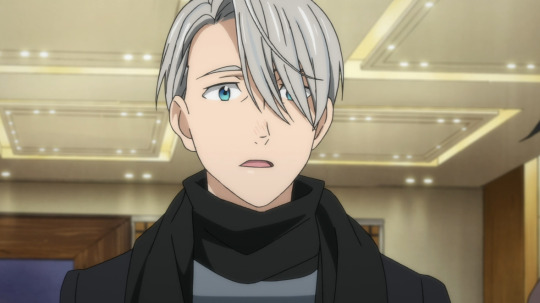
4. The necktie is a metaphor
This interpretation came up in a Twitter discussion with @maetae2288 (kudos to her for bringing this up!) and it can coexist with interpretations 1 and 2. If you tell a story that needed to be condensed to 12 short episodes, you don't waste precious air time on throwaway lines.
For this interpretation, I would like to refer to Tumbleweed's translation errors master post. It's a super long post, so I quote the relevant part:
「 初めて自分から繋ぎとめたいと思った人、それがヴィクトルです 」
[...]'For the first time in my life, there’s a person I want to hold on to. That person is Victor.’
Also, while I think this word choice is the best choice, 'hold on to’ doesn’t quite get all the connotations of 繋ぎとめたい across. Tsunagi tomeru is composed of two words, tsunagi = bind and tomeru = stop. It means tying the subject to something and stopping it from going away. Since he added 自分から, 'from/by himself’ in front of it, it infers Victor being the first person Yuuri wants to reach out to and bond with, and with those bonds, bind them together so that they would never part.
I highly recommend reading the full post if you're interested in the linguistic nuances of translations from Japanese to English regarding Yuri!!!.
In his speech, Yuuri voices his desire to form an inseparable bond with Viktor (it's quite a lot like "stay by my side and never leave" if you think about it, although he uses a different vocabulary). Bonds are often symbolised by a knot. In this sense, the necktie comment would refer to the new bond Yuuri and Viktor will form henceforth.
It's unclear when Viktor learns Japanese love language and dating culture (you can read my post on Japanese dating culture in YOI here). In episode 9, Viktor correctly identifies Yuuri's (accidental) marriage proposal, but when did he brief himself on these things? In fact, he uses love language as early as episode 3 ("I love katsudon"), but was he aware of this? Whether or not he is, it's beyond doubt that the creators knew what they were doing when they gave him this line. In this light, his necktie comment suggests that he understood Yuuri's kokuhaku very well and gave a unique response that refers to their future bond and is true to his character. This is top-notch storytelling.
To sum this up, whether Viktor understood Yuuri at once and responded accordingly, or this line foreshadows that he will understand somewhere between episodes 5 and 6, his comment implies that they will start dating soon after. And we see the result in episode 6.
If you enjoy my meta posts, please consider giving my blog a follow or checking out my works on AO3(link in bio). You will find the results of my meta musings in there!
#yuri on ice#yoi meta#my yoi meta#katsuki yuuri#viktor nikiforov#anime#meta post#interpretation#viktuuri#language barriers#love language#love confessions
262 notes
·
View notes
Text
The Beef Stroganoff Song! (arbitrary subtitle discourse edition)
So, you may have noticed here that the subtitles in this clip (from Symphogear GX episode 3) are fairly different from what you're used to seeing when people post this video, and the phrasing in the subtitles is fairly different from what the associated memes often say
For those who don't know, Symphogear got itself released on blu-ray by Discotek, and with that came with a new translation authored by Noelle (@ulsairi on twitter ) who is notable for being the only trans lesbian anime translator I know of off the top of my head.
Her translation appears, in my opinion, really rather polished and very good, and I strongly appreciate the way it's written and how much character it adds to the dialogue by giving everyone distinct voices and adapting things into more natural English. It's also a fair bit gayer. I haven't encountered many people who've seen these subs, but I think most fans of the series would consider these a net positive change. There are some people who are mad about these subtitles, and they can die mad.
Anyway, let's talk about the different phrasing of the beef stroganoff song. I'm mostly going to compare to Crunchyroll's subtitles for reference since that seems to be what most others go off of. Here's a link to that version.
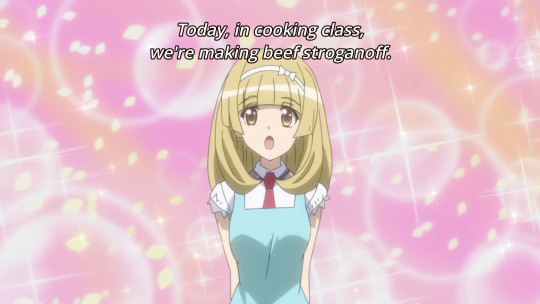
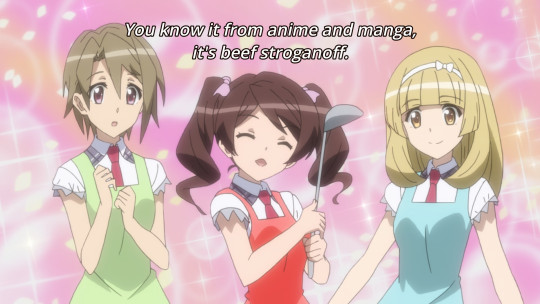
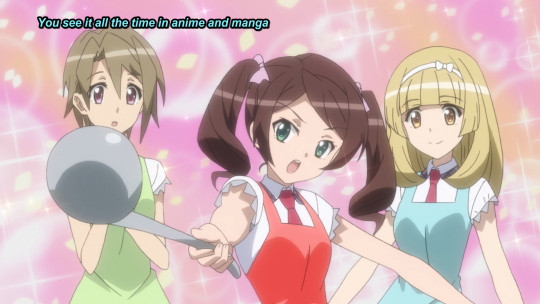
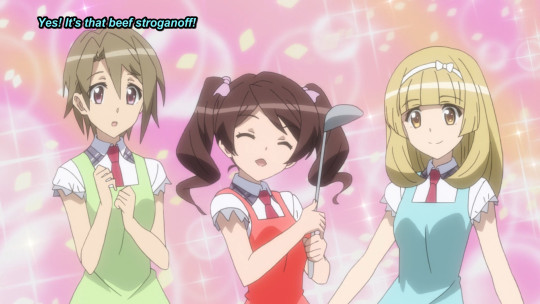
So right off the bat we can see here that while CR's translation appears to be a lot more, for lack of a better word, functional, Noelle's translation tries to apply more dialectal force "it's beef stroganoff/Yes! It's THAT beef stroganoff!" And generally communicate through the tone how excited the girls are to get started. Additionally you'll see throughout that the latter is a fair bit more lyrical, there's a lot more punctuation and verbal tics and filler phrases written into the dialogue to express that they are singing, which makes sense since Japanese tends to omit a lot of the sorts of prepositions that Noelle threw in here,
Like, Yumi (yes I went and looked up her name on the wiki) just says "beef stroganoffu" because it's obvious from context that it is beef stroganoff, she doesn't need to spell it out, at least, not in Japanese
(We know like maybe ten hiragana and 1 kanji do not trust us on Japanese this is all just basic shit we learned from online guides)
So this probably leads to a rushed translator from Crunchyroll (they are notoriously crunched for time) who's just trying to Get It Done probably not really bothering to throw in extra additional connecting letters to express the tone of the character, only doing so when it's required to make basic grammatical sense in the target language. So they likely didn't think to make the subtitles have flourishes like this that aren't explicitly in the original Japanese. Noelle meanwhile had the time to consider things like this and take such liberties in order to attempt to convey the same tone that was arguably implied by the Japanese, even if not explicitly put forth
And that's about all the things I should not repeat I guess, TL;DR, these subtitles are more fun to read because the translator had more time to think about the best way to make them more fun while still being accurate to the spirit of the original dialogue, who'd have thought!
(In case you're wondering, the Commie subtitles say kind of the same thing here, and y'know, it doesn't seem like a wrong translation, but also I really dislike this subtitle styling, orange on pink with that font and that drop shadow is just kinda bad. I appreciate the effort but like. Come on. Please fansubbers, please think about if the font and colors you chose actually work with the image you're putting them on)
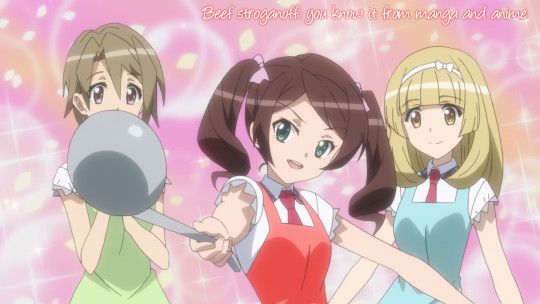
Moving on!
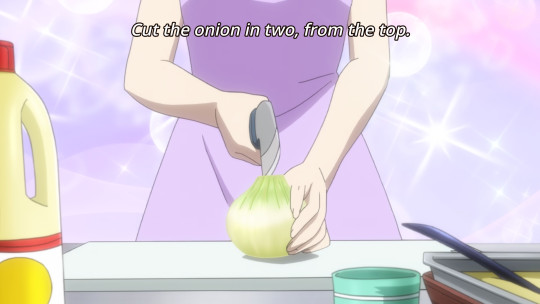
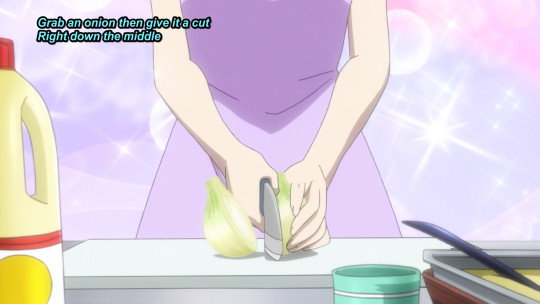
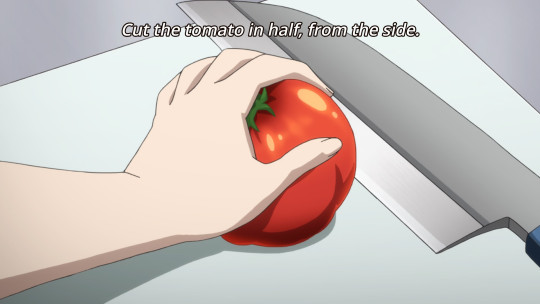
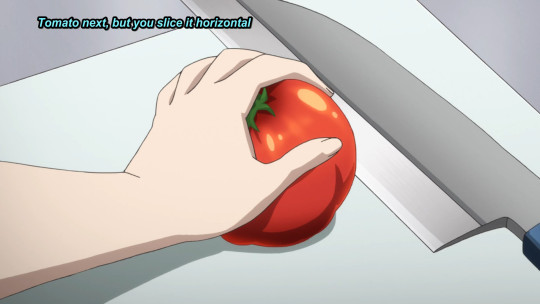
horizontal and middle rhyme with each other so you can almost actually sing this, actually let me take a moment to try it right now- never mind, I can't sing. Hahaha. I don't actually think it lines up that well with the melody But I thought it did! Didn't I? That's significant, that this actually reads like plausible lyrics to a silly song someone made up instead of a literal translation of a Japanese song
Anyway, here comes the first major difference!
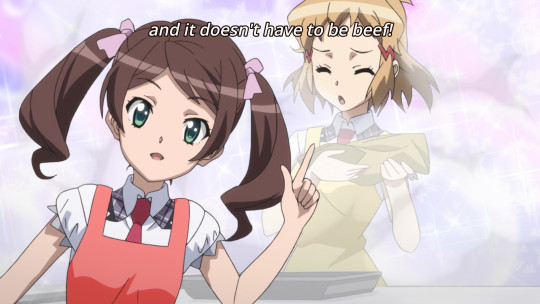
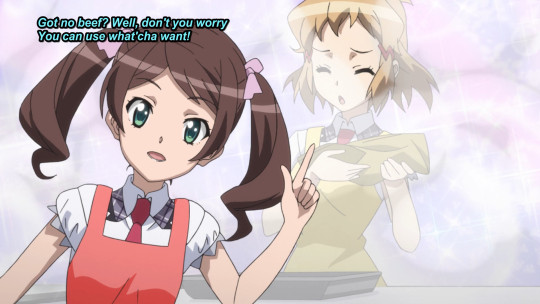
So in the Crunchyroll subtitles, Yumi says "it doesn't have to be beef" which in English (in my estimation) sounds a tad scatterbrained, like, "oh yeah sure beef but whatever really it doesn't actually matter," while Noelle's subtitles rather say "Got no beef? Don't you worry!" Which implies something different.
"It is recommended to use beef, but you may substitute something else if you are sorely lacking in beef" as opposed to "Oh the beef doesn't actually matter, zoinks lol!" CR's translation is kind of a bit funnier in how it sorta comes from nowhere without this qualification, which probably lead to this phrase's memeticness, but Noelle's translation seems more reasonable to me so yeah again, tada, yay for sensicalness.
Now here's another interesting change:
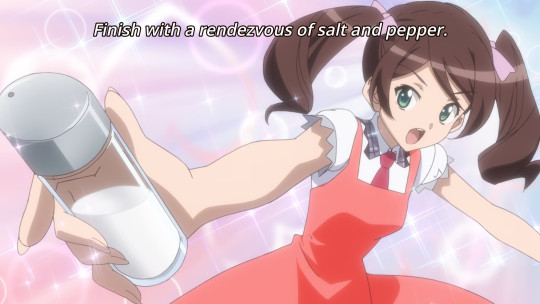
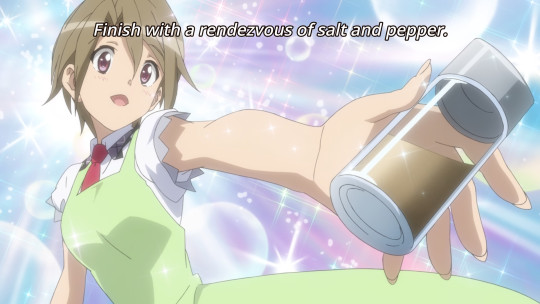
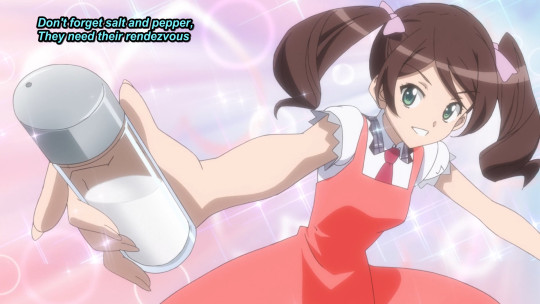
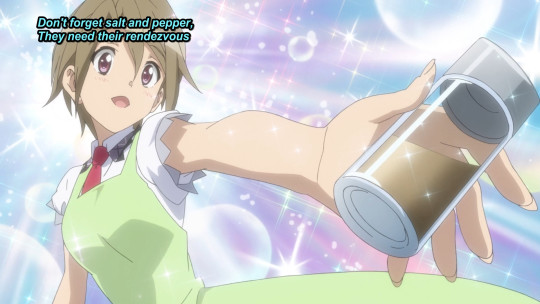
Again, the flat manner in which the CR subtitles say "finish with salt" with rendezvous only being included because that's literally what they said, is sort of absent any stronger emotional implication,
Noelle's translation meanwhile going with "don't forget them, they need it" imparts personhood upon the salt and pepper. The implication being that the girls are saying, "the salt and pepper are in love, please reunite them, they must be in gay love together." Or maybe you think the salt and pepper cannot be forgotten and must be reunited because they are Only Friends.
Whether you choose to believe that this is the salt and pepper getting married, or merely subtext, or an interpretation, or salt and pepper shipping bait, this is a deeply important tonal indicator because it reminds you that these girls are ultimately playing with their food!
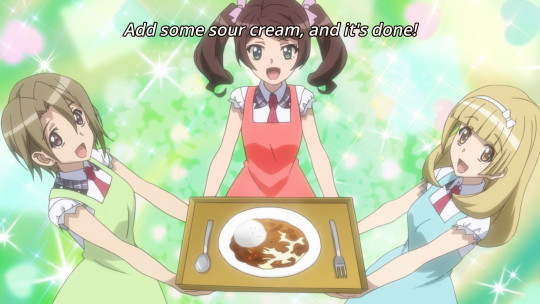
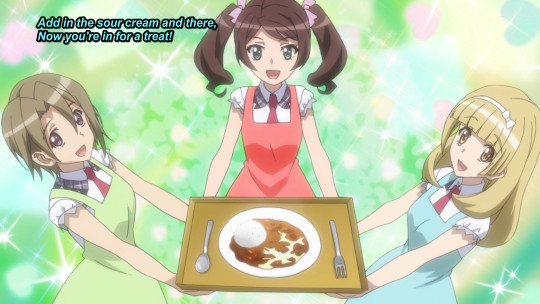
"And there, now you're in for a treat!" I don't think I need to explain this one.
Now, here's an interesting one!
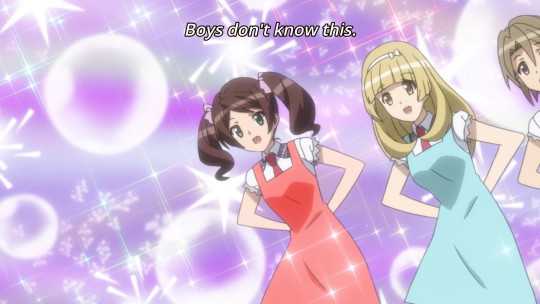
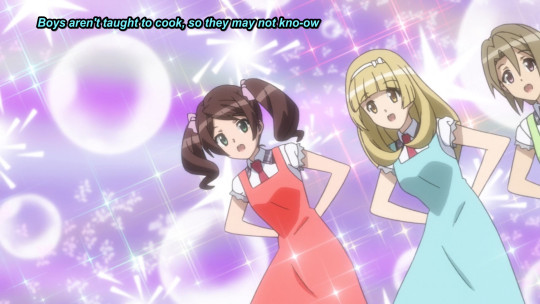
In the Crunchyroll subtitles, it just says the memetic "boys don't know this." With no context, no elaboration, no clarity, no qualifiers. Boys don't know. Did the boys magically get their brains wiped? Are the boys biologically incapable? Who knows. Nothing is said but that.
Noelle's subtitles, on the other hand, qualify this statement by saying "Boys aren't taught to cook, so they may not know" (And note again how, it says "kno-ow" to emphasize, once more, that they're singing, and also this lines up with the long "ooooo" sound they make at the end of this lyric, so cool)
There is now context! Boys aren't taught to cook! Anime and Japan's culture in general still pigeonholes people into gender roles! And an anime translator just wrote you a hidden translation note about it! You might be a boy, you might know how to cook, but certain boys in another part of the world aren't traditionally taught cooking, so they may not know
They may not, but they could!
Trust a trans person to express gender facts with subtle nuances like this in anime translations.
And with that lovely bit of good translation and good writing and good localization of a thing to make it make sense to people
Mew!
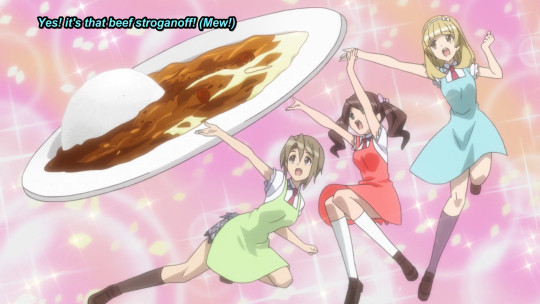
#symphogear#symphogear gx#beef stroganoff#translation discourse#boys dont know this#(or rather THEY MAY not)#(but could if they were told how!)#you know it from anime and manga#audrey (of the joystick system) posts
658 notes
·
View notes
Text
The Entirety of Japanese, Lesson #1
AKA - I'm sorry, you do have to learn all three scripts.
Welcome to our first lesson! Today, we are going to learn how to read Japanese.
Sort of.
See, it's not something you can learn in one day, or one lesson. Learning a language is a gradual process that doesn't cement until you start *using* it.
So we will go over the basics, both the WHY three scripts and the HOW to learn all three over time, and then provide 10+ FREE resources from all over the internet for you to practice with!
Let's go!
Why All Three Scripts?
Short answer: because I said so.
Kidding.
The Japanese language has no spaces in it. Unlike English where there is a space between each word, Japanese sentences look like this:
スモモも桃も桃のうち
All three scripts are in this sentence. It translates to "plums and peaches are both like peaches". An odd sentence, but here's why I chose it...
When you write it in *just* Hiragana (the basic, "first" phonetic script), it looks like this:
すもももももももものうち
Yikes. So many も, with no way to tell apart the multiple words in the も train.
So... how can you tell similar words apart when written out?
Wait, let's look back a bit. Can you tell where different words are in the sentence before? Yes. Even without being taught *anything* about the Japanese language, you can tell where different words start just by looking at it.
By writing in multiple scripts, you can tell similar words apart.
Okay... But How Do I Learn Them?
There's quite a few ways to learn them. In fact, on Thursday we will be publishing community responses from our Discord detailing how THEY learned the scripts.
But for now, here is the two first scripts you'll learn in their entirety, thanks to Coto Japanese Acamedy
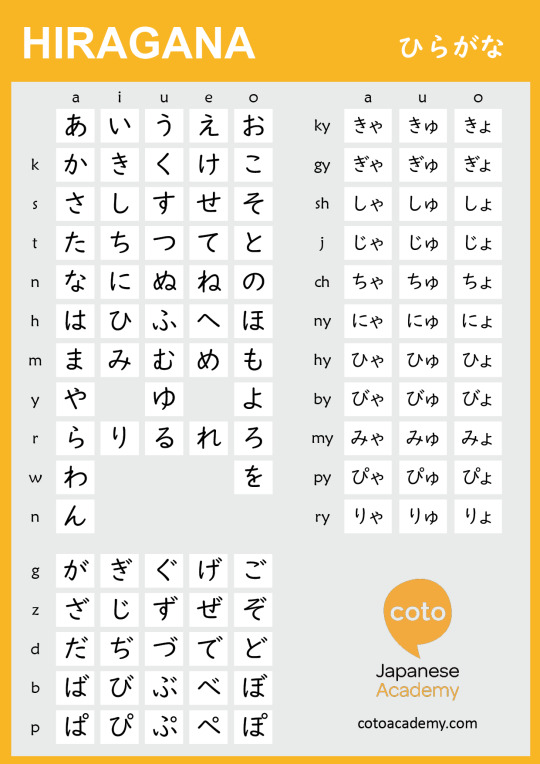
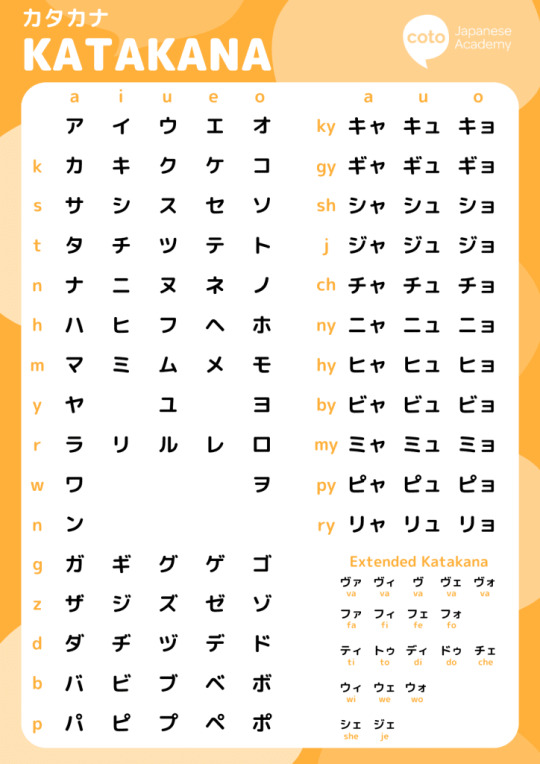
You'll learn these first for three reasons:
First, they are easier.
Second, you can spell any word in Japanese with these two scripts. Not a hard and fast rule, but Hiragana is used for native Japanese words and Katakana is usually used for international loan words, emphasis, names, and 'sound effect words', aka onomatopoeia.
Third, you'll see Hiragana above Kanji (the difficult one) that tells you how to pronounce Kanji.
As far as actually learning them, you *could* just write them down over and over.
Writing is super important when learning Japanese.
But it might be easier to start with some apps, games, and videos where you can learn the characters both in context AND within words.
Here's our favorite FREE resources:
Duolingo (Website, Android, and Apple) is great for learning singular words and Hiragana / Katakana, however explanations of grammar is limited to desktop. Still, PERFECT for the beginning stages regardless of device.
Bunpo is another free app for learning Japanese!
JapanesePod101's videos on Hiragana and Katakana over on Youtube are fantastic for hearing natural speach.
Tofugu's Hiragana and Katakana blog posts have the * best * mnemomics, with sound bites.
Busuu's (Website, Android, Apple) Japanese course starts off with Hiragana words to get you speaking immediately.
Kana (Apple, Android) is a free app dedicated to JUST Hiragana and Katakana.
Tae Kim's Guide to Learning Japanese is the holy grail for new Japanese learners. Of course, it has a no-frills explanations of all three scripts.
Japanese Ammo with Misa has detailed lessons on everything, including Kana.
Here's a video on the difference between printed and written Hiragana fonts.
And finally... our discord server.
Wait... what about Kanji?
Well, the problem is there's a lot to learn. A LOT.
You'll be learning them over the course of yearssssssss. But that's fine; you can tune into our lessons to learn them.
Join right here to practice what you learn! You'll also gain access to new friends learning the same language AND more free resources.
We can't wait to see you there!
#japan#japanese#japanese language#learn japanese#japanese studyblr#nihongo#japan travel#japanese culture#japan trip#anime and manga#anime#anime art
188 notes
·
View notes
Text

新年あけましておめでとうございます!
Happy New Year!
It's 2024 and a whole new year lies before us. I hope that this new year will bring you closer to all of your goals! Here are my 2024 Japanese Language Learning Goals!
1. Read one page a day of 日本の歴史366 (にほんのれきし366) every day in 2024.
This book introduces an interesting or important Japanese historical fact for elementary school students every day of the year (including February 29th for leap year). I started this book in 2023 but didn't have enough time to read it ever day. I'd like to try again in 2024 (wish me luck!).
2. Review and learn grades 4, 5, and 6 of the 教育漢字 (きょういくかんじ) - elementary school kanji.
In 2023 I mastered grades 1, 2, and 3 of the 教育漢字, and so in 2024 I'd like to finish up elementary school with the rest of the grades! That's a total of 566 kanji in 4, 5, and 6, which I think is a manageable goal for one year (the first three grades have 440 kanji total). When I say master, I mean that I'd like to be able to remember the definition and pronunciation, and be able to read the kanji, but I'll skip writing from memory because that would just take too much time with this many kanji.
3. Read at least one book every three months.
I have found that time constraints and life in general make it difficult for me to read a lot of long books in Japanese, but I think reading a book once a quarter might be manageable. I'll have to be very picky about the books I choose and keep them at or under my level for this to work.
4. Write at least one sentence in Japanese every day.
I think that one of my weakest areas is writing in Japanese. Written Japanese is different than spoken Japanese, and I'd like to be able to consistently write coherent sentences and learn where I could improve. Nothing helps you improve like consistent practice! I'd also like to try to post the sentences on HelloTalk for revisions and comments, and to push myself out of my comfort zone.
5. Practice Japanese at least 10 minutes every day.
Speaking of practice, this habit is one that I have kept up consistently for years. I try to spend at least 10 minutes of even my busiest days doing mindful review or learning, whether it be flash cards, looking up vocabulary words, looking up a kanji in the dictionary, or having an intentional conversation. Despite not having studied formally for almost 10 years, I attribute my continued growth to consistent and purposeful study.
今年もよろしくお願いします!
I look forward to your support this year, too!
I enjoy posting my successes as well as my trials and tribulations on this langblr, and I look forward to see how everyone else takes on their goals in the new year!
I wish everyone a wonderful New Year full of language learning success!
#日本語#japanese#japanese language#japanese langblr#japanese studyblr#langblr#studyblr#日本語の日記#japanese diary#japanese goals#japanese goals 2024#tokidokitokyo#japanese studyspo
90 notes
·
View notes
Text
How I read and enjoy books in my target language
Please note that I write about what works for me and share advice based on my own experiences. If you have a different opinion or if you use other methods, that's absolutely fine. Do whatever works for you.
Since some people asked me how I read books in my target languages, I would like to describe my way of reading in this post. I focus on reading for some time now and I'm very happy with my progress so far. This doesn't mean that I won't change a few things in the future (I'm constantly gaining experience and changing my learning style accordingly).
1. Choosing a book
Before I start reading, I have to choose an appropriate book, obviously. After trial and error I realized how important this step is. My ideal book is:
not too easy (I won't learn much)
not too difficult (if I can't follow at least the rough story I won't enjoy it)
interesting (motivation to read it)
I try to choose a book that is slightly above my level so that I can follow the story without looking up too many words but also learn new words. I don't need to understand everything, but I don't want to feel lost either. Balance is important.
2. Trying the first chapter
After choosing a book that seems to be appropriate, I try to read the first chapter (and sometimes the first two chapters, if they are short). I pay attention to things like:
Can I follow the story?
Is the story interesting?
Do I like the writing style?
If I can answer (most) questions like these with "yes", I continue reading the book.
Do I only understand single words or sentences here and there? Do I have no clue what happens? Then I put the book aside for now and choose an easier one. There's no shame in admitting that this book is too difficult at the moment. Deciding what I don't read is just as important as deciding what I read.
3. Reading
If the level of difficulty is okay, I start reading the book. In my experience, the first few chapters are always the hardest. I need time to get used to the writing style, the used vocabulary and the story.
In the case of the japanese version of Harry Potter, the beginning was difficult because of the writing style. But after two chapters, I began to enjoy the story and so I continued. That's why I always try to read at least the first chapter. A book that seems difficult in the beginning can be very enjoyable once I've read enough pages.
When I come across an interesting word or a sentence I like, I highlight it. I try to not highlight too much stuff, though. Two, maybe three words per page is usually my maximum. Enjoying the story is my number one priority. I can read several pages without highlighting anything, even though there are words I don't know. As long as I don't feel the strong urge to look up a word, I just continue reading.
In many cases I can understand words from context and learn them over time just by seeing them again and again. That's why I don't look up words immediately. I wait to see if they come up more often.
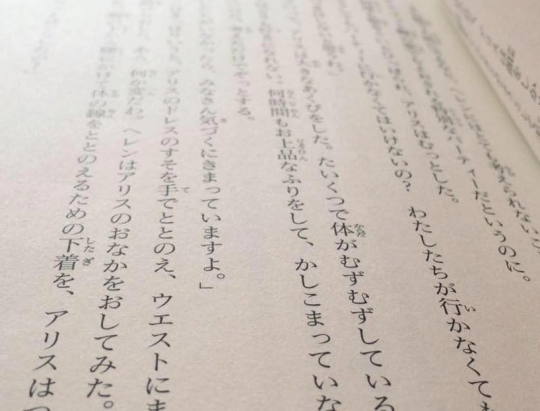
After I finished one chapter, I look up all highlighted words and read the passages that contain these words a second time. This way, I can connect the meaning with the full context. I don't try to memorize the word; I just try to understand it in this particular context before I continue.
Most of the time, I learn words unconsciously. If the book is easy enough, it's not so difficult to guess the meaning of certain words. While reading, I don't focus so much on words I don't know. I just focus on following the story. I may not always understand every detail, but as long as I can follow and enjoy the story, everything is fine. I learn so much by engaging with the language in a meaningful way and enjoying the content. Sometimes, I even forget that I am reading a book in a foreign language!
I have to add, that I'm already familiar with basic sentence patterns and that I have experience with reading books in my target languages. I finished the book "Remembering the Kanji" which makes it easier to guess the meaning of words. Knowing lots of kanji is a great advantage.
I have still a long way to go, of course, but this natural way of learning vocabulary may not work well at very early stages because you need a foundation first. After you are familiar with the dialogues and example sentences in your textbook, graded readers are a good choice in my opinion. Graded readers can make the transition from textbooks to easy books aimed at (young) native speakers easier.
Tip: One thing that helped me is to take a card, write down words I looked up and put this card into the book. When I read it a second time, I don't need to look them up again. Reading texts more than once can help to get more familiar with new words. Plus, writing helps me to remember words better. Reviewing them in their original context is much more enjoyable to me than reviewing them with flashcards. In the picture below you can see how my cards look like:
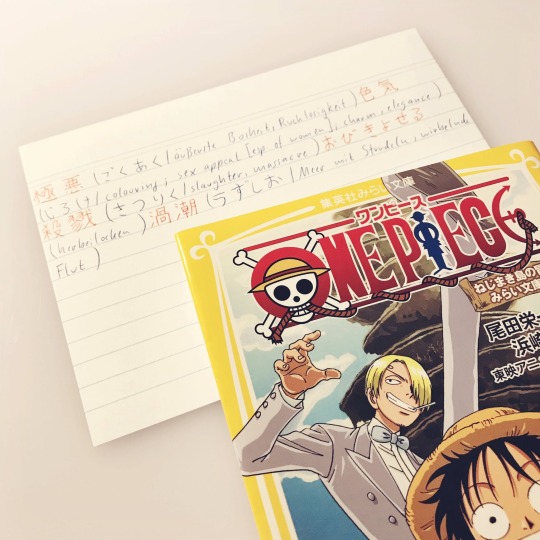
4. Enjoy!
I made enjoying books my number one priority. This is what helped me to make much more progress than before. All I need is enough reading material at the right level and a dictionary. As soon as I get absorbed in a book, I don't think about learning a language. I just want to enjoy the story. The more experience I gain, the better I become at understanding the language as a result. There's no need to force it or to hurry.
What I like about just enjoying a book and learning words naturally is that it's so simple. I don't necessarily need my computer, a certain software, add-ons, ... All I need is something I can read. After reading a chapter, I only look up a few words as I described above and that's it. Then, I often feel so motivated that I want to read more. I read much more than before because I enjoy it so much.
515 notes
·
View notes
Text
Malleus Info Compilation part 17: Malleus and Details
Malleus is the founder and only member of the school’s “Gargoyle Study Club”. He explains, “we do quite little…all I do is walk around campus”.

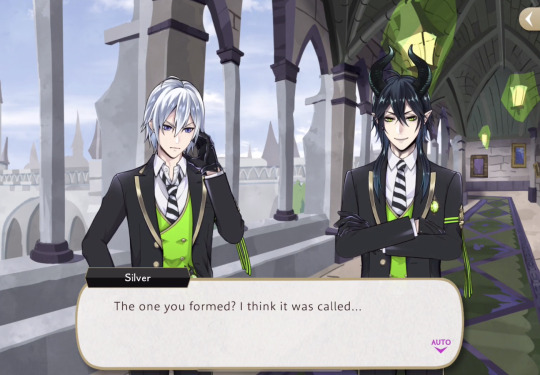
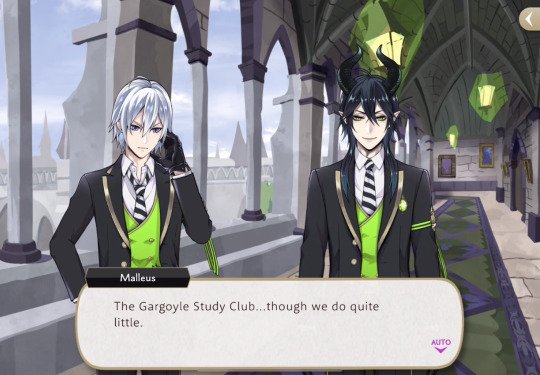
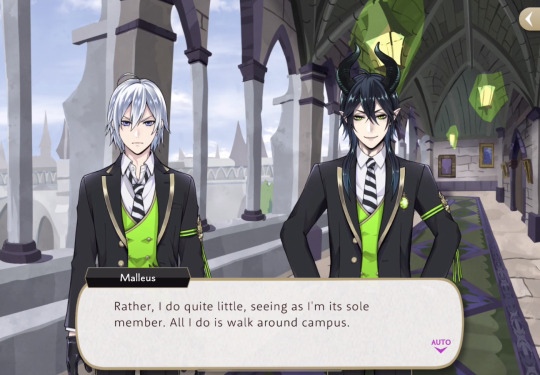
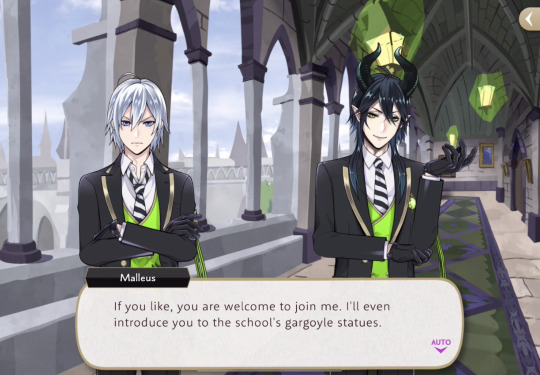
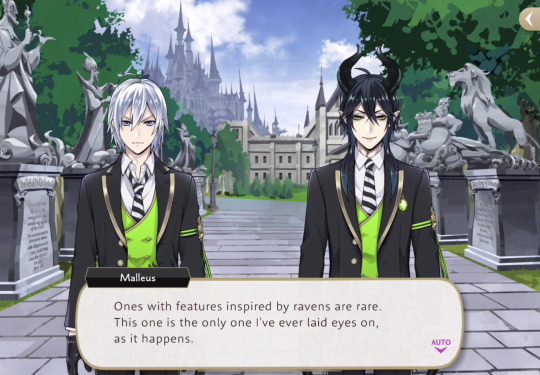

Malleus offers to “introduce” Silver to the school’s gargoyle statues in a vignette, showing him a rare, raven-inspired gargoyle by the front gate (in a possible homage to what the blue fairy does to Maleficient’s raven, Diablo, in Disney’s Sleeping Beauty).
Malleus becomes visibly irate when Silver says he thought that gargoyles were generally “modeled after demons and such”, and again when he mistakes a grotesque for a gargoyle (which Malleus describes as “tantamount to an insult”).
In an interesting line Malleus says that “Most of the gargoyles of Night Raven College are relatively new compared to the school itself. I believe they were added one by one, year after year. It fascinates me.”
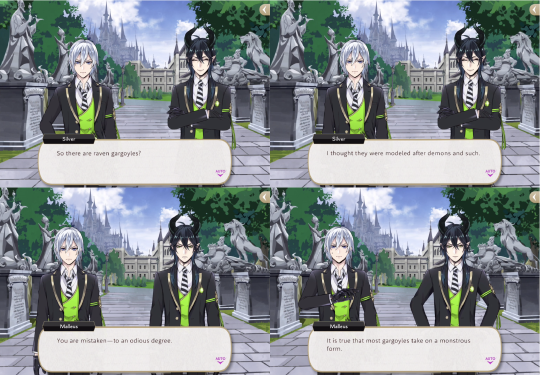
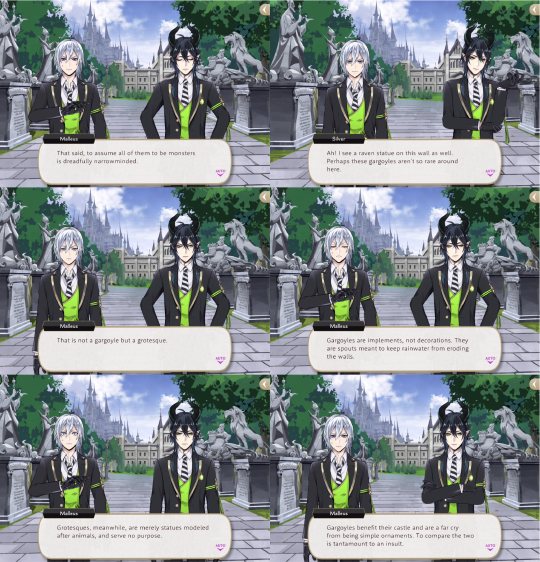

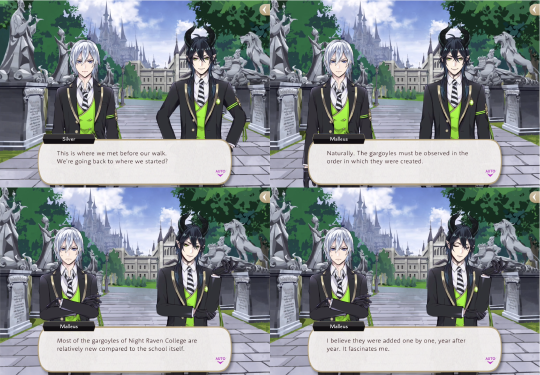
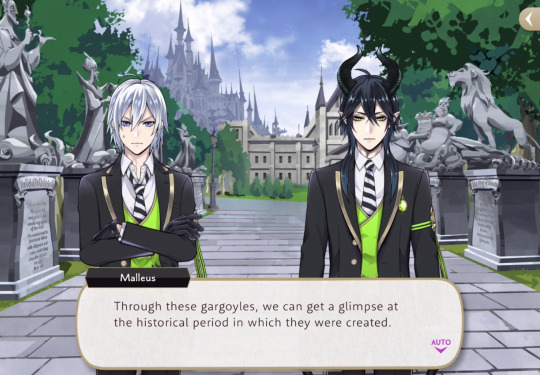
We learn that Ramshackle Dorm seems to have gargoyles of its own. Malleus explains, “They look frightful, and yet they are beings devoted to the preservation of their home. Sometimes, what you see with your eyes is the complete opposite of the truth.”
Silvers offers to gift Malleus a gargoyle for his room and Malleus starts a lecture on how “statues that do not act as a spout are not gargoyles at all”. Malleus does, however, have a statue or grotesque in his dorm room, in the shape of a dragon.
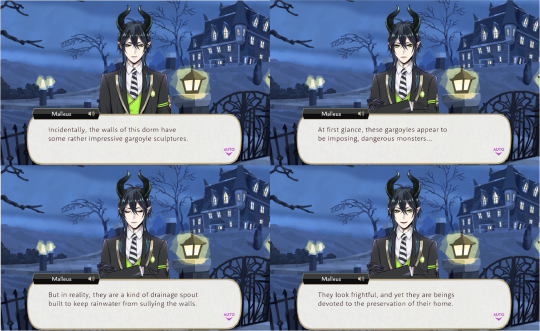

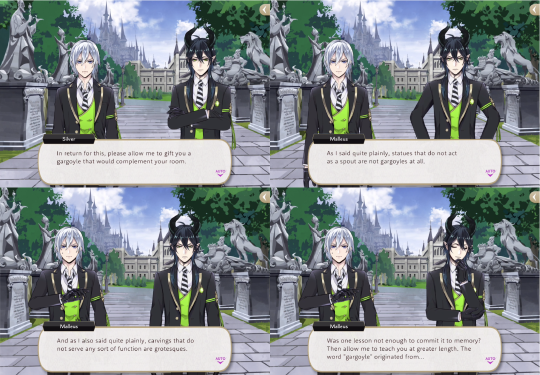

Malleus seems to have an interest in architecture in general, commenting on the “wonderful example of bilateral symmetry” that is Kalim’s home in the Firelit Sky event.
Malleus also becomes annoyed when others mistake Eastern longs for Western dragons, cautioning Lilia for saying “eastern dragon”.
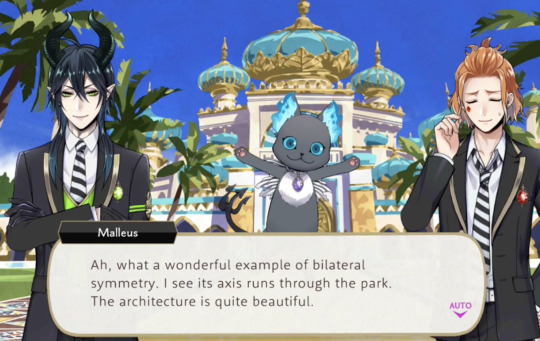
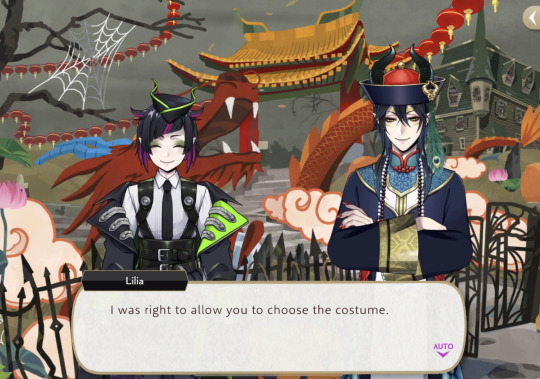
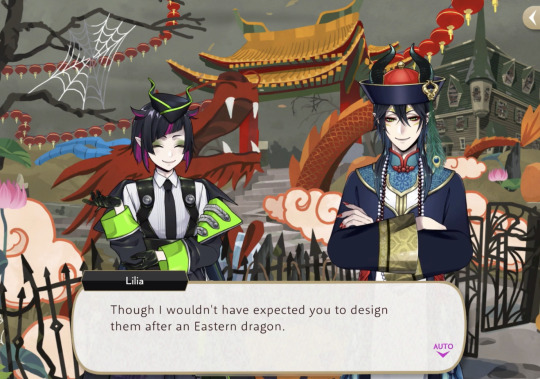
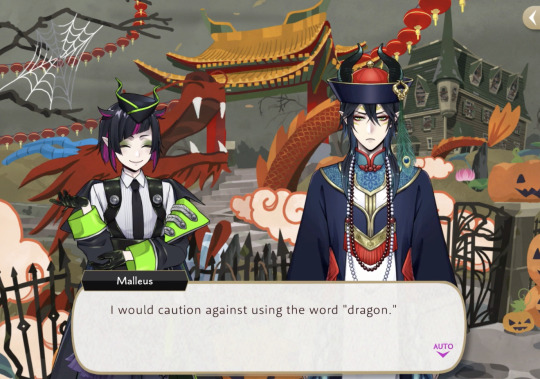

(for the curious: in Japanese we have two different kanji for longs (竜 and 龍) which are pronounced the same, and then the word ドラゴン for western dragons, which is literally just the English word “dragon” in katakana. According to the explanations I found, there might be no real difference between the meanings of 竜 and 龍? 竜 is simpler so it is used more often in everyday life and 龍 is used more often in names, possibly because it looks cooler. )

(When Malleus says long in the original game, he uses the kanji 龍 (pronounced Ryuu in Japanese), and then ドラゴン (pronounced dragon) for western dragons. I love the solution that EN came up with by calling them longs and dragons, with long being the romanization of the Chinese word for eastern dragons (I believe?), since Japan’s kanji for dragon did originally come from China, so it’s going way, way back.)
Malleus also corrects Trey’s comparison of dragon fruit to “the scales of longs”. Vil says Malleus gave him an “hour-long impassioned speech about how longs are entirely distinct from dragons as we know them”. Lilia explains, “Malleus can be obsessive about these things”.
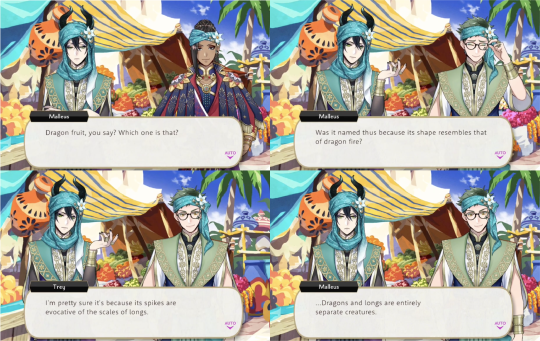
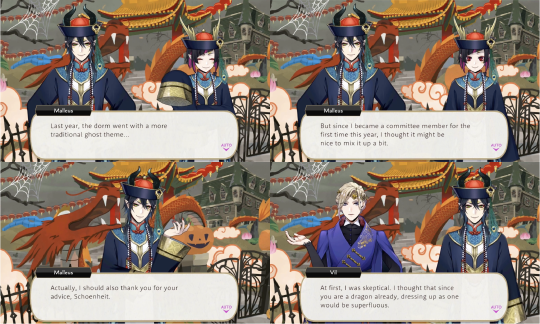
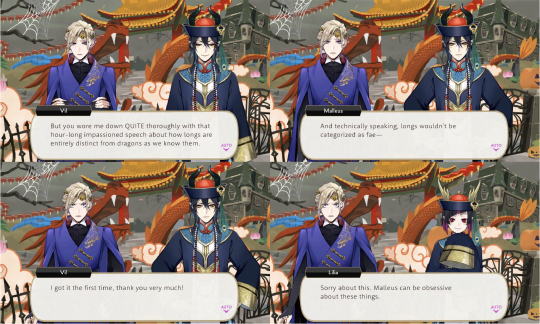
Malleus is voiced by Kato Kazuki. More information here:
107 notes
·
View notes
Text
How I make my Japanese flashcards

I've been able to switch all of my flashcards to mochi SRS from anki and I think this has made a huge difference for me. I'll make another post explaining why mochi is so much better but for now just take my word :)
How I find vocab terms:
I have a few main sources that I use for finding new vocabulary. I have an immersion deck, with subdecks for each piece of native media that I pull the words from (とびもり、ハピネス、しゅんとにほんご、etc). I also have a deck for vocabulary I pull from bunpro. This is great because it means I'm getting words that interest me (from immersion content) and words that are more useful/common (from bunpro)
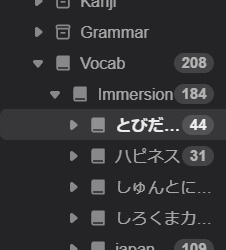
2. How I make flashcards:
I make a template for each type of card, and when I create a deck, I set all cards to the template type, and then just fill out the information. I have two card types for Japanese: vocab and kanji
Card types:
Japanese vocab
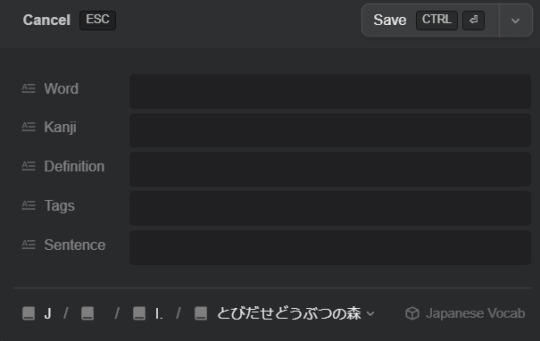

for these cards, I add the word (using kanji if applicable), then add the definition, an example sentence, and link my kanji cards so I can reference them when reviewing the vocab card. Furigana is added automatically!
Kanji
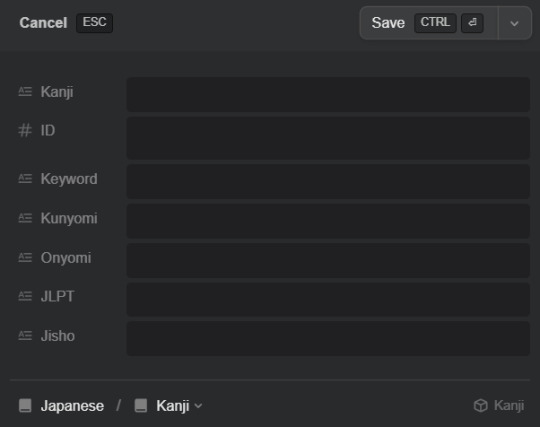

For these, I add the kanji, the heisig kanji ID, all of the keywords in jisho, the kunyomi and onyomi readings, the JLPT level, and then the link for the kanji in jisho. This helps me for quick reference, but if I want more info I can easily pull up the jisho page. I have all kanji cards in an archived deck (they won't come up in reviews) and I have them linked to my vocab cards. This way, if a kanji is used in any vocab cards, I can see all of the linked vocab
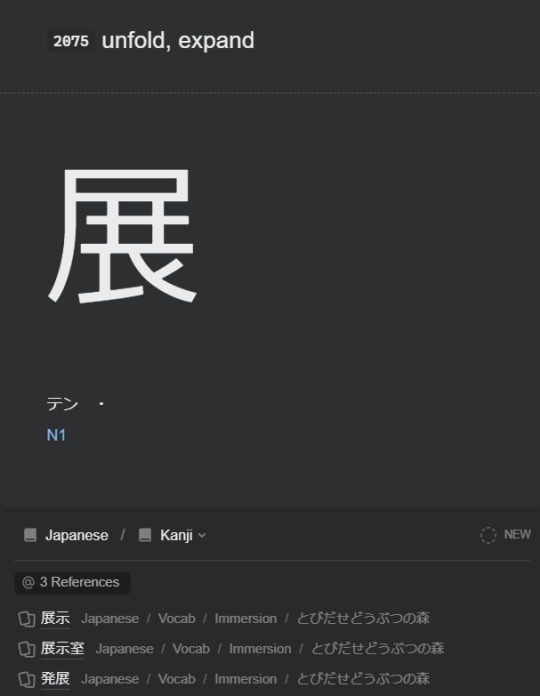
If you're starting your Japanese learning journey or trying to find a new flashcard solution, I hope this helps! 頑張りましょう! :)
39 notes
·
View notes